- Home
- Ann M. Martin
Main Street #8: Special Delivery Page 2
Main Street #8: Special Delivery Read online
Page 2
“I’d better get going,” said Allie, rising to her feet. “I have to pack for the week.”
“For the love of Mike,” said Min. “A baby on the way.”
“A trip to New York City,” said Ruby.
“A new cousin,” said Flora.
“And all before eight-thirty in the morning,” added Min, looking at her watch.
After Aunt Allie left, Ruby looked at her own watch. “It is only eight-thirty,” she said in surprise. “It feels much, much later.”
“That’s because you usually lie around in bed until ten on the weekends,” said Flora.
Ruby put her hands on her hips. “So? Does that make me a criminal?”
“No,” said Flora.
“Well, all right then.”
Ruby stalked upstairs to her room. She shook her bank even though she knew it was empty. She opened her wallet. It held exactly three dollars and ten cents, less than it had held twenty-four hours earlier, since she’d been to the mall in between. She needed money for Christmas presents and she needed it fast. And now with an additional person to shop for — her new cousin — she needed even more money.
If only Ruby were creative like her sister. Flora was going to make a gift for the baby, and that was usually less expensive than buying something. But Ruby had zero interest in sewing or knitting. Or scrapbooking or crafting of any sort. Maybe she could prepare a song to sing to the baby. Last year as a Christmas gift to her family she had performed one of Min’s favorite carols. But Ruby didn’t think a baby would be interested in Christmas carols. No, she definitely needed a way to earn some money.
Ruby sat on her bed, ignoring the giant ball of clothing and shoes at the foot of it. She remembered something her father had once told her: In order to start a successful business, you have to know your clients, which means knowing your community.
Ruby felt she knew Camden Falls fairly well. She had lived there for less than two years, but because of Needle and Thread, she spent a lot of time on Main Street, and Main Street was the heart of the town. Ruby had walked up and down Main Street countless times. She knew every store and business there, from Needle and Thread to College Pizza, from Dr. Malone’s dental practice to the real estate agency. She knew Jackie and Donna, who ran the post office, and Sonny Sutphin, who worked in the second-hand bookstore, and Frank, who owned Frank’s Beans, the coffee shop. The family of her new friend Hilary ran the diner and lived above it, and her neighbors the Fongs owned an art gallery. Every now and then a new business came to town (Ruby had seen signs for a magic store that was to open soon), but in general, Ruby felt she knew Main Street. And since she was a member of the Children’s Chorus and also took dance lessons, she was acquainted with all sorts of other people, too. Not to mention that she knew every single one of her neighbors in the Row Houses.
Ruby thought and thought, but she didn’t know what kind of business to start. Wasn’t she a little young to start a business anyway? And didn’t starting a business take a lot of time? Ruby needed fast cash. How did kids her age earn money? Baby-sitting? She knew of only one baby — Grace Fong — and Flora always got to sit for her. (Ruby fervently hoped that eventually Aunt Allie would let Ruby sit for her cousin.)
Well. This was getting frustrating. It was just one of the many problems associated with being ten years old as opposed to, say, twelve.
Ruby heaved a sigh. Maybe she could pet-sit. But no, in order to get jobs, she would have to wait for the pet owners to go away on trips, and she didn’t have time for that.
What else did Ruby know about her community? What did people need? What would they pay other people to do?
What would I pay someone to do? Ruby asked herself.
And in an instant, she had her answer. She would pay someone to do all those things that needed doing but that she didn’t want to do — cleaning up her room, for instance, or vacuuming the bedrooms (her current household chore).
“That’s it!” exclaimed Ruby, jumping to her feet. “I’ll be the Doer of Unpleasant Jobs!” Now, that was a business she could actually start. She wouldn’t need anything except herself — no store, no equipment. There must be, she thought, any number of unpleasant jobs that people would pay her to do.
Ruby tore down the hall, grabbed the cordless phone from Min’s bedside table, and brought it back to her room. She closed her door and dialed Lacey Morris’s number. “Lacey!” she cried. “Guess what! I had a brilliant idea. I’m going to start a business. I’m going to be the Doer of Unpleasant Jobs. Do you want to be my partner?”
Lacey Morris, who lived at the left end of the Row Houses with her parents and her sister and brothers, said cautiously, “Your business partner? What would I have to do?”
“Help me with the unpleasant jobs.”
“But what kind of unpleasant jobs are we talking about?”
“I don’t know. Anything no one wants to do. Cleaning and stuff. All those jobs people keep putting off.”
On the other end of the line, Lacey scrunched up her nose. “There’s a reason people keep putting them off.”
“Yes,” said Ruby. “They’re unpleasant.”
“Exactly. Which is why I don’t think I want to do them.” Lacey paused. “I, um, sort of have a lot of allowance money saved up. Besides, I want to put in more practice time on my solo.” Lacey also had a solo (a tiny one) in the Thanksgiving concert.
“Okay-ay,” sang Ruby, “but you’re missing out on a great opportunity.” She hung up the phone and punched in Hilary Nelson’s number. “Hilary? Do you want to be a Doer of Unpleasant Jobs?”
“What?” said Hilary.
Ruby had to explain her idea again. “So what do you think?” she asked finally.
Hilary paused for so long that Ruby said, “Hello?”
“I’m here. It’s just that, well, I told Mom and Dad I’d give them extra help in the diner. This is going to be one of our busiest seasons, you know.”
Ruby also knew that Hilary got paid for helping her parents. “I guess I’ll just have to do all the unpleasant jobs myself,” she said.
“Good luck with that,” replied Hilary.
Ruby lifted a pile of papers, library books, and CD’s from her desk chair. She wasn’t sure where to put them, so she added them to the chaos at the foot of her bed. Then she sat at her desk, a pad of paper before her, and chewed on the end of a pen.
I could, she thought, do unpleasant jobs for people on Main Street. Main Street was, after all, just a couple of blocks from the Row Houses, within easy walking distance. But would storekeepers and business owners need a Doer of Unpleasant Jobs? Ruby wasn’t sure. Maybe she should start closer to home, with her neighbors.
Ruby crossed her room and stuck her head out into the hallway. “Min!” she called. “I’m going into business! I’m going to do unpleasant jobs. Can I make flyers to give to our neighbors?”
“Which neighbors?” Min called back.
“In the Row Houses.”
“Row Houses only? Okay, go ahead.”
Ruby sat at her desk again. She wrote:
Do you have unsightly messes?
Are your closets stuffed with unfinished projects?
Do you hate scrubbing and cleaning?
Then call me, the Doer of Unpleasant Jobs!
I’ll do anything for
Here Ruby paused, uncertain how much to charge for her work. She would have to discuss that with Min. She turned back to the flyer and added:
Never put off until tomorrow
what you can pay someone else to do today!
Then she hastily drew a star in each corner of the page, sensing that Flora would spend much more time decorating the flyer if it were up to her, which it wasn’t.
She grabbed the flyer and rushed across the hall to her sister’s room. “Surprise!” she said.
“What?” mumbled Flora, who was lying on her bed, reading To Kill a Mockingbird.
“I’m in business.” Ruby thrust the flyer at Flora.
“Hey, this is a really good idea,” said her sister after she’d read it. “Very practical. And, um, entrepreneurial. Are you sure you don’t want to embellish the ad a little more, though? You know, draw —”
“No!” screeched Ruby. “I’m done. Except for the money part. I have to talk to Min about that.”
An hour later, her fee decided on and seven flyers (complete with a single star in each corner) printed out on Min’s computer, Ruby headed down her walk, ready to get her business rolling. She decided to start with the Morrises and walked briskly in their direction.
The Row Houses, an imposing granite structure built in the 1800s and consisting of eight attached and nearly identical homes, had once belonged to wealthy Camden Falls families, families who could afford maids and butlers and gardeners. The current families, to Ruby’s relief, did not employ maids or butlers or gardeners, which was exactly why they might need Ruby.
Ruby rang the Morrises’ bell, and could hear Lacey practicing her solo inside. I really ought to be practicing my own solos, she thought. (She had two — a tiny one like Lacey’s and a much longer one.) While she was at it, it couldn’t hurt to start practicing her even bigger solo for the Christmas concert.
Oh, well, thought Ruby. I have time.
The sound of the bell brought thundering feet to the door, which was flung open by Alyssa, the youngest Morris, proudly exclaiming, “I got here first!”
“Can you give this to your mom and dad?” Ruby asked, handing her one of the flyers. “It’s very important. I’ve gone into business.”
Alyssa took the flyer, silenced by the grandeur of Ruby’s announcement.
Ruby headed next door to the house that until recently had belonged to the Willets but now belonged to the Hamiltons. She hesitated before ringing the bell and then reminded herself that strange Mrs. Hamilton wasn’t there; Ruby would not have to face her. Was it okay to feel relieved that Mrs. Hamilton was in the hospital — a mental hospital? Probably not, but Ruby felt relieved anyway. And when Willow Hamilton, who was Flora’s new friend, opened the door, Ruby gave her a genuine smile. “Anything that needs doing, I can do it!” she proclaimed.
Ruby continued down the row. She handed a flyer to Margaret Malone, Dr. Malone’s older daughter, skipped her own house, and rang the bell of Olivia Walter. Olivia answered the door and took the flyer with interest. “Maybe I could pay you to do something about my brothers,” she said.
Mr. Pennington, who lived next to Olivia, wasn’t home, although Ruby could hear old Jacques barking on the other side of the door. She left a flyer under a rock on the front stoop and knocked at the Edwardses’.
“Ruby! Ruby! Good morning!” Robby Edwards exclaimed enthusiastically when he answered the door. “Look, I’m still in my pajamas! I don’t have to work at Sincerely Yours today, that’s why,” he added, as if Ruby had asked.
Robby, who was eighteen and had Down syndrome (and who was one of Ruby’s favorite people), worked at the store recently opened by Olivia Walter’s parents. Ruby handed him a flyer.
“What’s this?” asked Robby, squinting at it. “The Doer of Unpleasant Jobs? That’s you?”
“Yup,” said Ruby proudly. “I can do anything at all.” She leaned forward and whispered, “I need money.”
“Oh,” said Robby knowingly.
“So be sure to give that to your mom and dad.”
“Right-o,” Robby replied, and closed the door.
Ruby visited the last house in the row, the Fongs’, but no one answered the bell, so she slipped the flyer under a corner of their doormat.
Now all she had to do was sit back and wait for the phone to ring. Ruby would be rich in no time.
The car that was spinning its way from Camden Falls, Massachusetts, to New York City contained two suitcases, a car seat for an infant, and one person, the driver, Allie Read. Allie drove steadily. The car was silent. No music was playing and the radio was turned off. Allie needed to think, and she was glad for the quiet of the car — no distractions. No phone calls, no doorbells, no e-mail.
Allie wanted to be in New York already and wished she could will herself there, but she was also grateful for this small island of time in which to mull over the great change that was suddenly taking place in her life.
A baby on the way.
How long had Allie wished for this?
Years. She had wished for it for years. She had wished for it when she was a girl and wanted to be the mommy instead of the little sister, and she had wished for it when she and Paul had dreamed of their wedding and their life together afterward, and she had wished and wished for it, harder than ever, after Paul had left her.
A baby on the way.
That morning, Allie had tossed the two suitcases into the backseat of her car. One was full of her things — enough clothes for a week in Manhattan — and one was full of things for a baby — mostly for a baby girl, since she had once been so sure that she and Paul would adopt a girl from China. But the adoption process, Allie had learned quickly, could be long and complicated and unpredictable. She might still adopt a baby from China or some other country. Someday. But right now a baby in New York needed her.
The highway hummed along, spreading out before and behind Allie’s car, and she thought of the trip she had made to Camden Falls almost a year earlier. It had been her first trip back home in a very long time, and she had made it because Paul was suddenly gone. He had left her the way people leave in movies. She had woken up one morning to find his side of the bed empty. (This was not unusual since he liked to be at his office by eight o’clock, and Allie worked at home as a writer.) But that morning a note was pinned to his pillow. Actually pinned to it. Allie had imagined him rummaging through their drawers, searching for an elusive safety pin. The note had said simply: Allie, I won’t be coming back. I’ve known for a long time that things aren’t right between us. Sorry. Paul.
What on earth did that mean? Allie hadn’t known things weren’t right between them. Didn’t something like that deserve a discussion? A phone call at the very least? But there had been no discussion or phone call, only an e-mail later in the day saying that he would come by on Saturday to pack up his things, and that if Allie didn’t want to see him, she should arrange to be out of the apartment.
That particular Saturday was the Saturday after Thanksgiving. Not long after Paul had collected his things (Allie decided not to speak to him and fled to Debbie and David’s apartment for the day), Allie had written to Min saying she wanted to come home for Christmas. To everyone’s surprise, including Allie’s, she hadn’t returned to New York for months. Christmas came and went, New Year’s Eve came and went, and Allie found that she had no interest in living in the old apartment in the city. Eventually, she sold the apartment, bought a house in Camden Falls, and the town in which she had grown up became her home again. And now it would be the town in which she would raise her own child.
A baby on the way.
Allie looked at her watch, looked at the speedometer, checked the gas gauge. Her thoughts turned to her conversation with Mrs. Prescott the previous evening. When Allie had recovered from her shock (“The birth parents chose me to adopt their baby?!”), she asked Mrs. Prescott question after question. Dozens of questions.
Which was why Allie was now reasonably sure that the baby would not in fact be born during the week that she could stay in New York, and that she would be returning to Camden Falls empty-handed. The baby would almost certainly come home later. And yet, Allie had packed a suitcase full of baby things, of lacy pink and yellow dresses and bonnets.
Allie smiled. “I hope the baby is a girl,” she said aloud. “Otherwise, I’ll have to buy an entire new wardrobe.” Which, of course, she would happily do. Boy or girl, Allie didn’t care. She just wanted to be a mom.
Allie drove past a green sign reading NEW YORK CITY — 24 MILES. She drew in a breath, felt her pulse quicken. She was excited, but she was also frightened, she realized. What if the baby was born premature
ly and there were complications? That could happen. That was why the doctors wanted to delay the birth. What if the birth parents decided to keep their baby? What if Allie brought the baby home to Camden Falls and found out that raising a child on her own was harder than she had thought it was going to be? She knew she would have lots of help, starting with Min and Flora and Ruby, but still …
Half an hour later, her heart now pounding, Allie crossed into Manhattan. She headed for the West Side Highway and drove past the familiar sights — the Hudson River, with its boats and barges, and Riverside Park, where she and Paul occasionally took Sunday morning walks (even though the park was far from their neighborhood in the West Village) and watched the children in the playgrounds and the dogs in the dog runs.
At 30th Street Allie turned east, drove to 7th Avenue, threaded her way south to 14th Street, and finally found a parking space just half a block from her friends’ apartment on 12th Street. Her old neighborhood. Allie unloaded her suitcases, locked the car, and fervently hoped she wouldn’t see Paul somewhere, his arm slung casually across another woman’s shoulders, their heads bent in discussion.
She lugged the suitcases to the entrance of David and Debbie’s apartment building and was cheered to see that Shef was on duty at the front desk.
“Good afternoon!” he greeted her. “I haven’t seen you in a long time.”
“Hi, Shef.” Allie smiled. “It’s nice to see you. Did Debbie and David tell you I’ll be using their apartment this week?”
In answer, Shef pulled a set of keys out of the desk drawer and held them aloft. “Everything’s ready for you. Let me know if you have any problems. Do you want a cart for your luggage?” He handed her the keys.
Ten minutes later, Allie walked breathlessly through the door of the apartment that she hadn’t seen in a year. She wanted to walk through it slowly, to look at the view from each window, but instead she pulled her cell phone from her purse and checked it for messages. Not a single one. Even so, she called Mrs. Prescott. “Any word?” she asked, knowing what the answer would be.

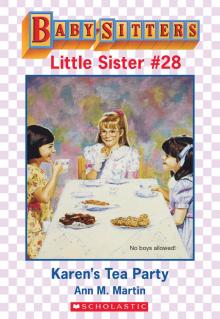 Karen's Tea Party
Karen's Tea Party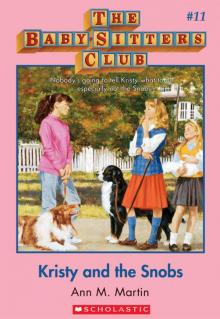 Kristy and the Snobs
Kristy and the Snobs Best Kept Secret
Best Kept Secret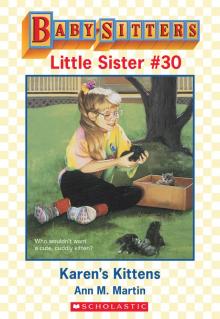 Karen's Kittens
Karen's Kittens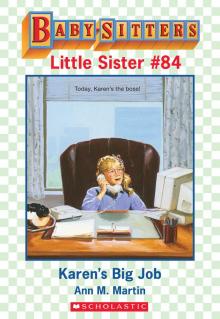 Karen's Big Job
Karen's Big Job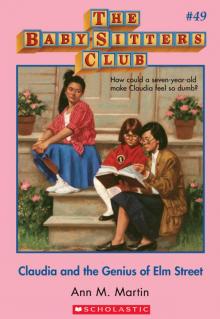 Claudia and the Genius of Elm Street
Claudia and the Genius of Elm Street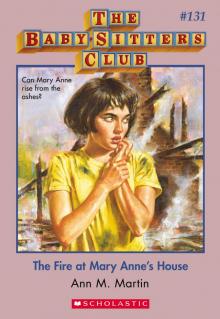 The Fire at Mary Anne's House
The Fire at Mary Anne's House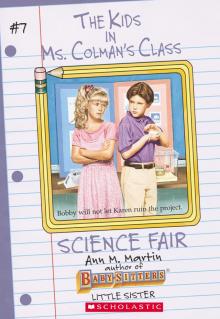 Science Fair
Science Fair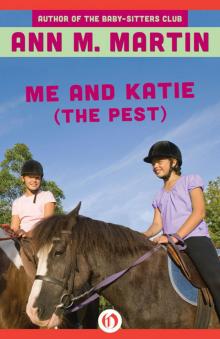 Me and Katie (The Pest)
Me and Katie (The Pest)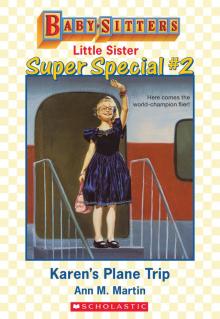 Karen's Plane Trip
Karen's Plane Trip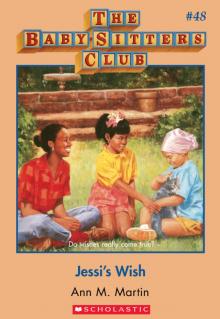 Jessi's Wish
Jessi's Wish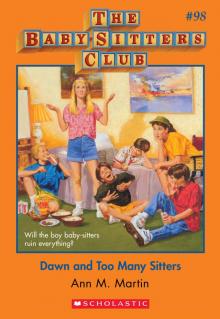 Dawn and Too Many Sitters
Dawn and Too Many Sitters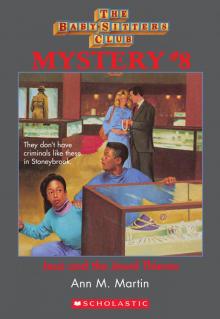 Jessi and the Jewel Thieves
Jessi and the Jewel Thieves Eleven Kids, One Summer
Eleven Kids, One Summer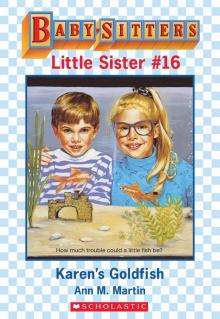 Karen's Goldfish
Karen's Goldfish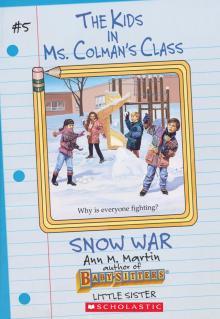 Snow War
Snow War Abby and the Secret Society
Abby and the Secret Society Keeping Secrets
Keeping Secrets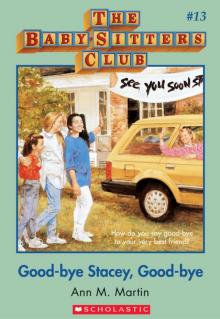 Good-Bye Stacey, Good-Bye
Good-Bye Stacey, Good-Bye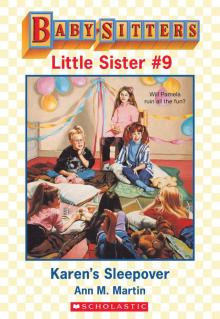 Karen's Sleepover
Karen's Sleepover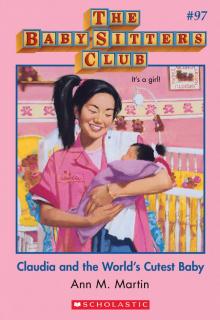 Claudia and the World's Cutest Baby
Claudia and the World's Cutest Baby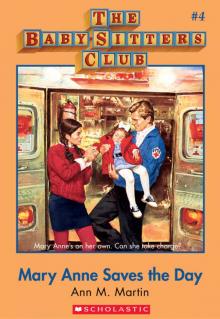 Mary Anne Saves the Day
Mary Anne Saves the Day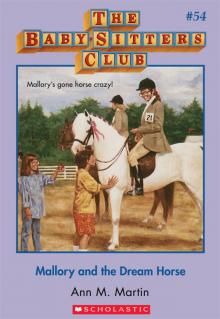 Mallory and the Dream Horse
Mallory and the Dream Horse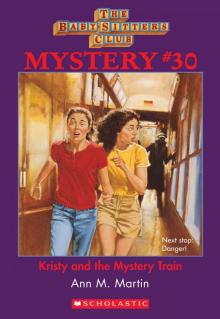 Kristy and the Mystery Train
Kristy and the Mystery Train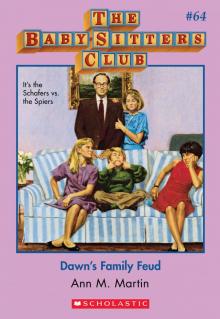 Dawn's Family Feud
Dawn's Family Feud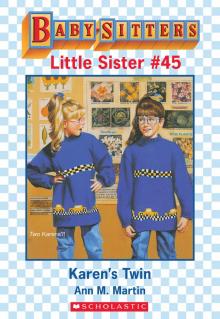 Karen's Twin
Karen's Twin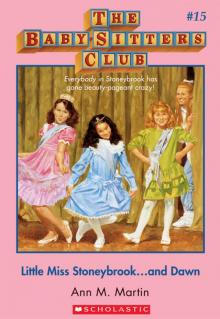 Little Miss Stoneybrook... And Dawn
Little Miss Stoneybrook... And Dawn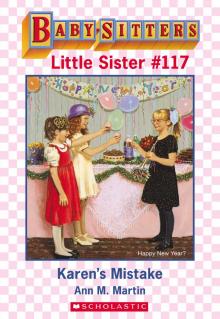 Karen's Mistake
Karen's Mistake Karen's Movie Star
Karen's Movie Star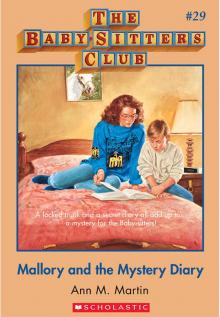 Mallory and the Mystery Diary
Mallory and the Mystery Diary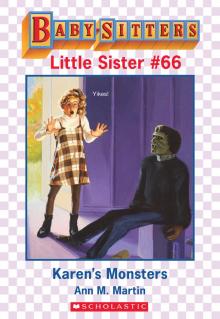 Karen's Monsters
Karen's Monsters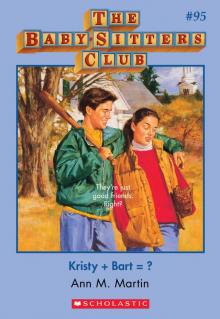 Kristy + Bart = ?
Kristy + Bart = ?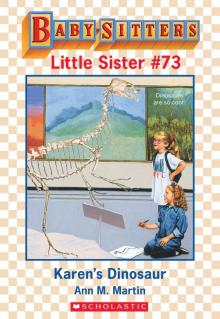 Karen's Dinosaur
Karen's Dinosaur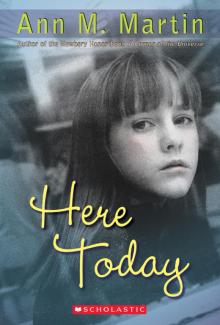 Here Today
Here Today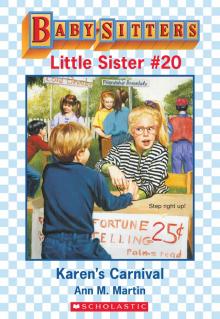 Karen's Carnival
Karen's Carnival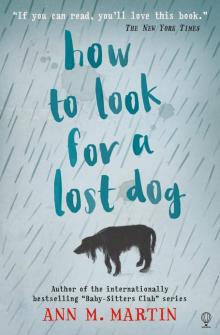 How to Look for a Lost Dog
How to Look for a Lost Dog Stacey vs. Claudia
Stacey vs. Claudia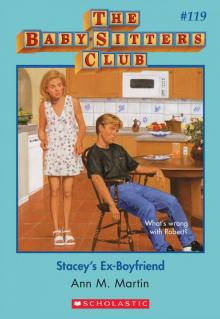 Stacey's Ex-Boyfriend
Stacey's Ex-Boyfriend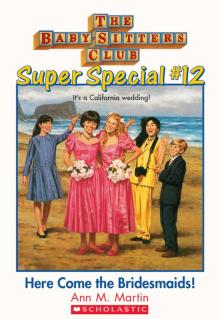 Here Come the Bridesmaids!
Here Come the Bridesmaids! Graduation Day
Graduation Day Kristy's Big News
Kristy's Big News Karen's School Surprise
Karen's School Surprise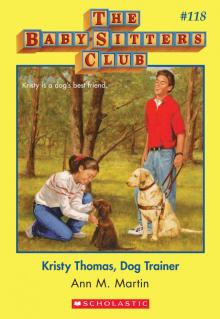 Kristy Thomas, Dog Trainer
Kristy Thomas, Dog Trainer Baby-Sitters' Christmas Chiller
Baby-Sitters' Christmas Chiller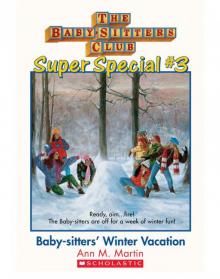 Baby-Sitters' Winter Vacation
Baby-Sitters' Winter Vacation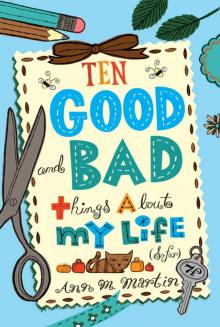 Ten Good and Bad Things About My Life
Ten Good and Bad Things About My Life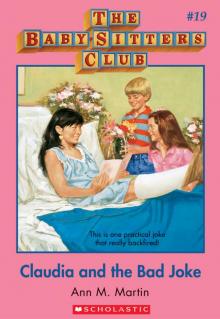 Claudia and the Bad Joke
Claudia and the Bad Joke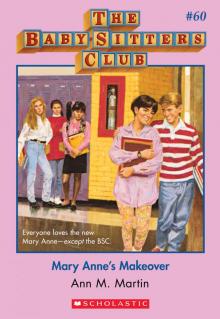 Mary Anne's Makeover
Mary Anne's Makeover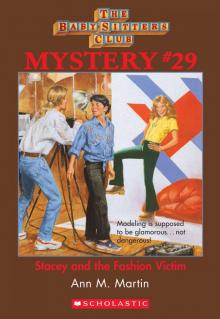 Stacey and the Fashion Victim
Stacey and the Fashion Victim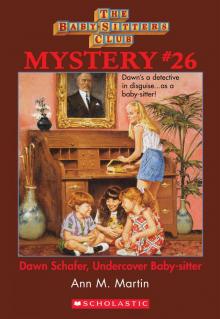 Dawn Schafer, Undercover Baby-Sitter
Dawn Schafer, Undercover Baby-Sitter Karen's Tuba
Karen's Tuba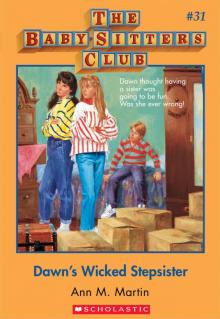 Dawn's Wicked Stepsister
Dawn's Wicked Stepsister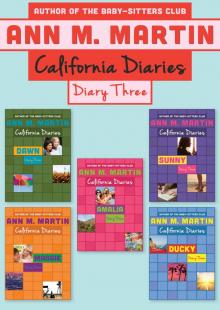 Diary Three: Dawn, Sunny, Maggie, Amalia, and Ducky
Diary Three: Dawn, Sunny, Maggie, Amalia, and Ducky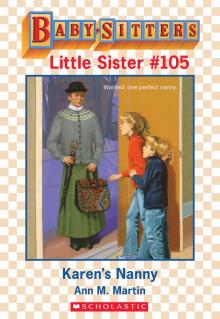 Karen's Nanny
Karen's Nanny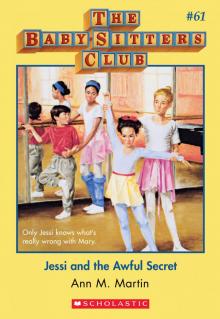 Jessi and the Awful Secret
Jessi and the Awful Secret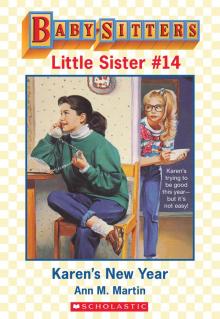 Karen's New Year
Karen's New Year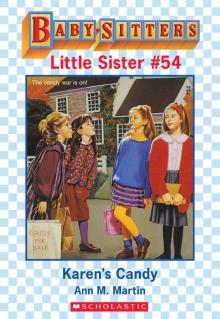 Karen's Candy
Karen's Candy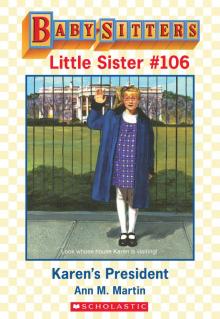 Karen's President
Karen's President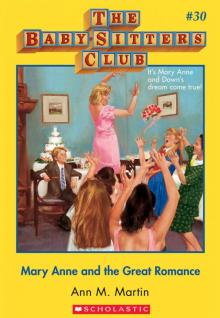 Mary Anne and the Great Romance
Mary Anne and the Great Romance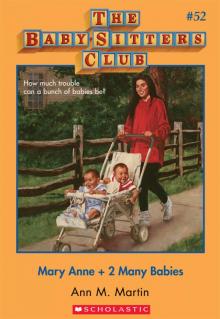 Mary Anne + 2 Many Babies
Mary Anne + 2 Many Babies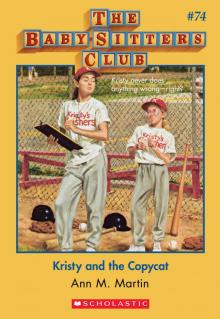 Kristy and the Copycat
Kristy and the Copycat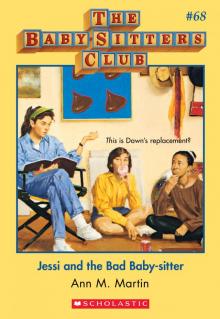 Jessi and the Bad Baby-Sitter
Jessi and the Bad Baby-Sitter Claudia, Queen of the Seventh Grade
Claudia, Queen of the Seventh Grade Claudia and the Lighthouse Ghost
Claudia and the Lighthouse Ghost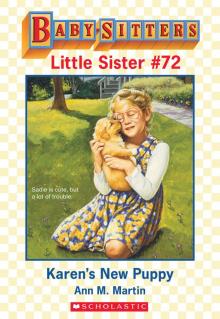 Karen's New Puppy
Karen's New Puppy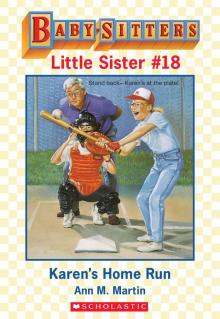 Karen's Home Run
Karen's Home Run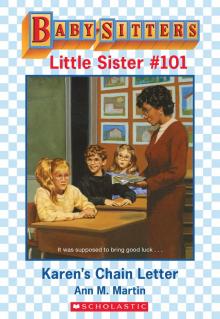 Karen's Chain Letter
Karen's Chain Letter Kristy in Charge
Kristy in Charge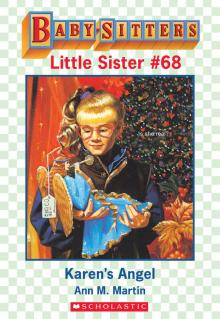 Karen's Angel
Karen's Angel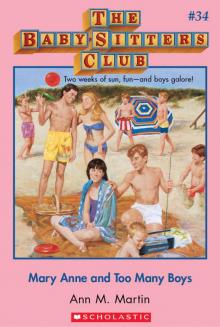 Mary Anne and Too Many Boys
Mary Anne and Too Many Boys Karen's Big Fight
Karen's Big Fight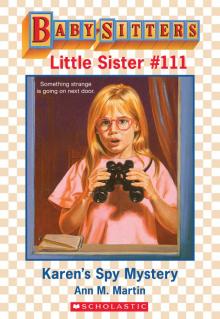 Karen's Spy Mystery
Karen's Spy Mystery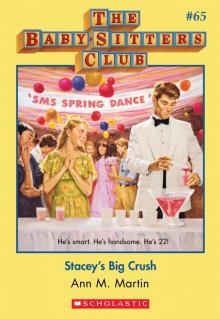 Stacey's Big Crush
Stacey's Big Crush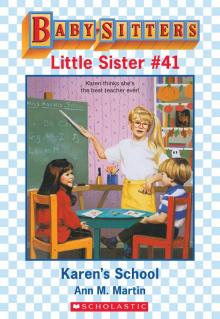 Karen's School
Karen's School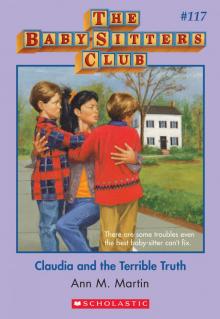 Claudia and the Terrible Truth
Claudia and the Terrible Truth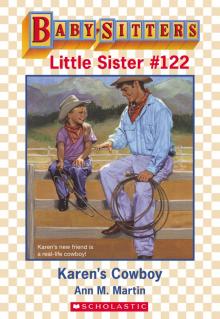 Karen's Cowboy
Karen's Cowboy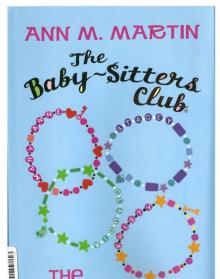 The Summer Before
The Summer Before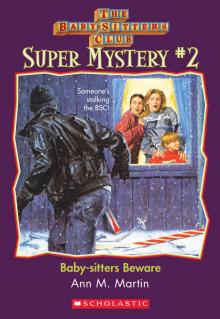 Beware, Dawn!
Beware, Dawn! Belle Teale
Belle Teale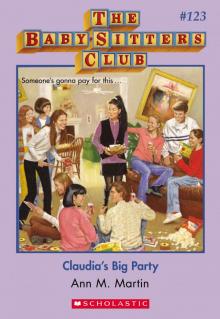 Claudia's Big Party
Claudia's Big Party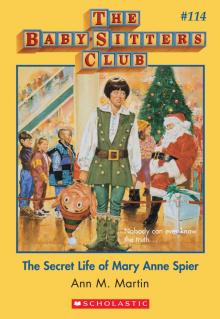 The Secret Life of Mary Anne Spier
The Secret Life of Mary Anne Spier Karen's Book
Karen's Book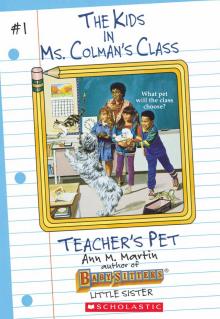 Teacher's Pet
Teacher's Pet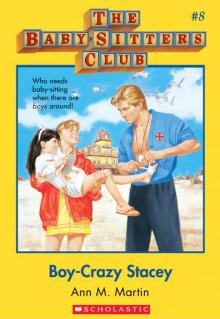 Boy-Crazy Stacey
Boy-Crazy Stacey Claudia and the Disaster Date
Claudia and the Disaster Date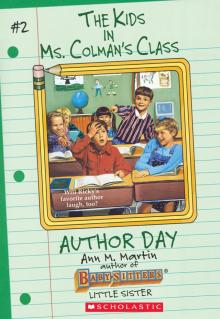 Author Day
Author Day Claudia and the Sad Good-Bye
Claudia and the Sad Good-Bye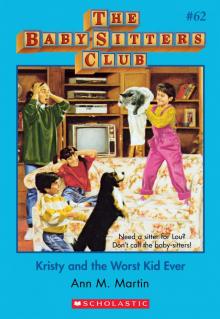 Kristy and the Worst Kid Ever
Kristy and the Worst Kid Ever Yours Turly, Shirley
Yours Turly, Shirley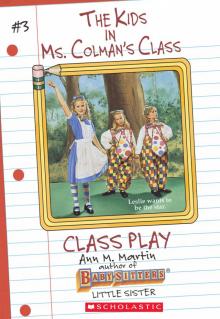 Class Play
Class Play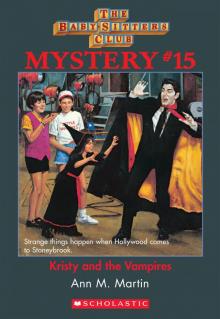 Kristy and the Vampires
Kristy and the Vampires Kristy and the Cat Burglar
Kristy and the Cat Burglar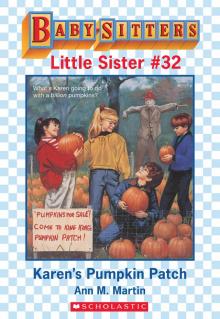 Karen's Pumpkin Patch
Karen's Pumpkin Patch Stacey and the Mystery at the Empty House
Stacey and the Mystery at the Empty House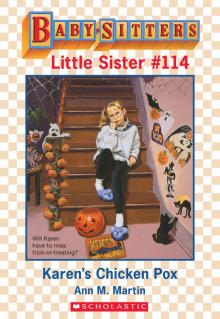 Karen's Chicken Pox
Karen's Chicken Pox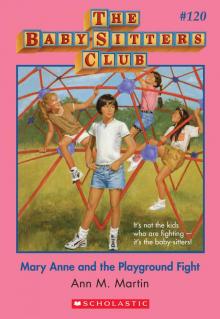 Mary Anne and the Playground Fight
Mary Anne and the Playground Fight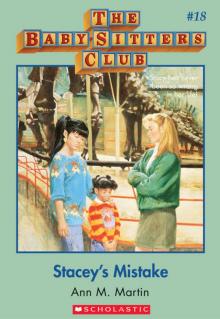 Stacey's Mistake
Stacey's Mistake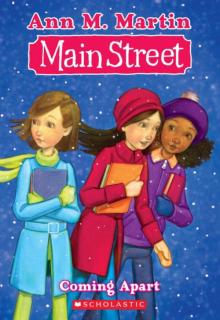 Coming Apart
Coming Apart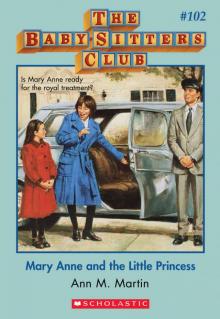 Mary Anne and the Little Princess
Mary Anne and the Little Princess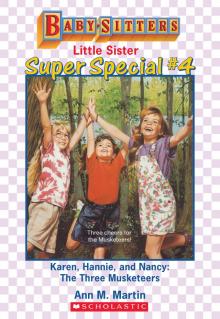 Karen, Hannie and Nancy: The Three Musketeers
Karen, Hannie and Nancy: The Three Musketeers 'Tis the Season
'Tis the Season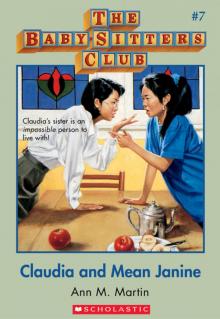 Claudia and Mean Janine
Claudia and Mean Janine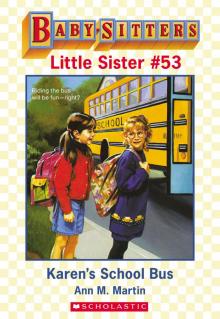 Karen's School Bus
Karen's School Bus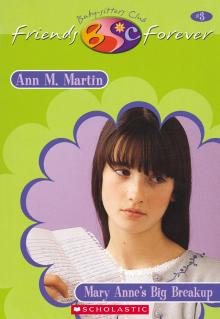 Mary Anne's Big Breakup
Mary Anne's Big Breakup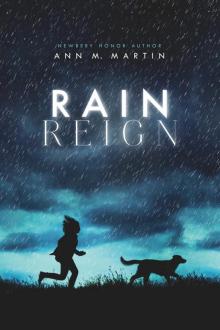 Rain Reign
Rain Reign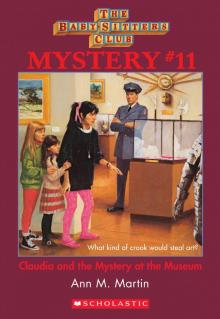 Claudia and the Mystery at the Museum
Claudia and the Mystery at the Museum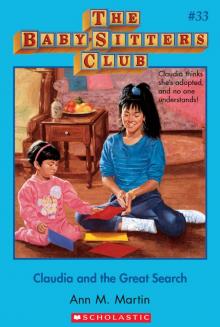 Claudia and the Great Search
Claudia and the Great Search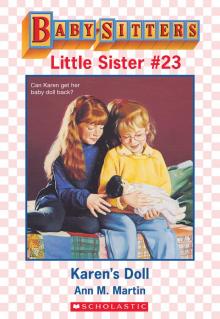 Karen's Doll
Karen's Doll Shannon's Story
Shannon's Story Sea City, Here We Come!
Sea City, Here We Come!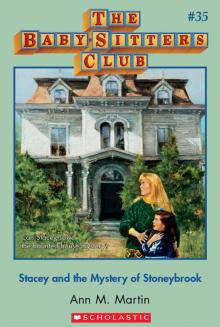 Stacey and the Mystery of Stoneybrook
Stacey and the Mystery of Stoneybrook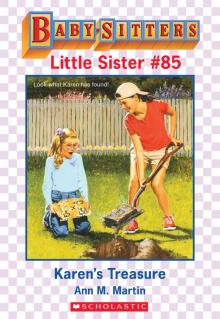 Karen's Treasure
Karen's Treasure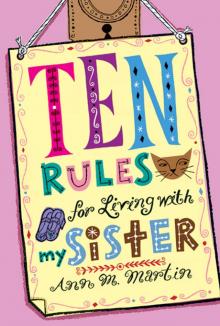 Ten Rules for Living With My Sister
Ten Rules for Living With My Sister With You and Without You
With You and Without You Baby-Sitters' Island Adventure
Baby-Sitters' Island Adventure Karen's Fishing Trip
Karen's Fishing Trip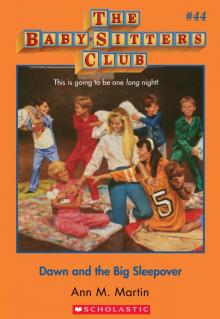 Dawn and the Big Sleepover
Dawn and the Big Sleepover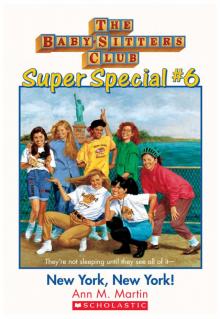 New York, New York!
New York, New York! Ten Kids, No Pets
Ten Kids, No Pets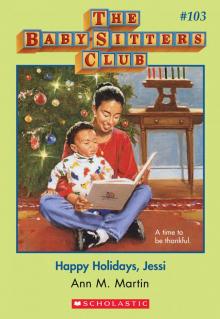 Happy Holidays, Jessi
Happy Holidays, Jessi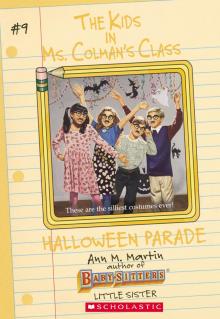 Halloween Parade
Halloween Parade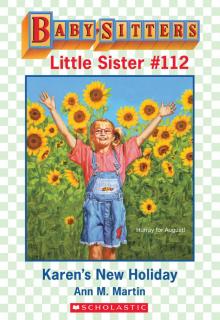 Karen's New Holiday
Karen's New Holiday Kristy Power!
Kristy Power!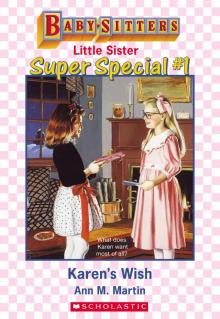 Karen's Wish
Karen's Wish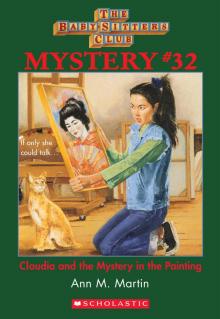 Claudia and the Mystery in the Painting
Claudia and the Mystery in the Painting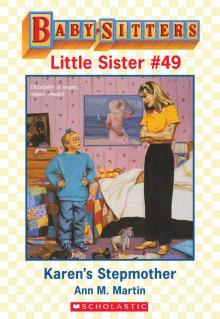 Karen's Stepmother
Karen's Stepmother Abby in Wonderland
Abby in Wonderland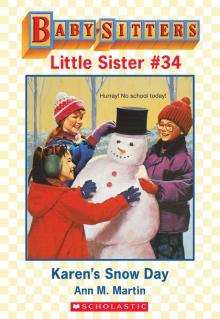 Karen's Snow Day
Karen's Snow Day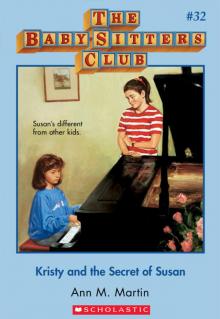 Kristy and the Secret of Susan
Kristy and the Secret of Susan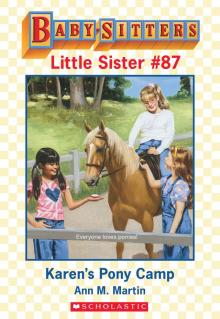 Karen's Pony Camp
Karen's Pony Camp Karen's School Trip
Karen's School Trip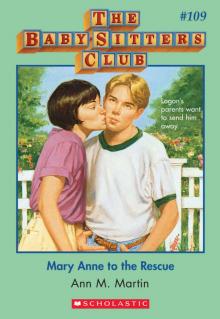 Mary Anne to the Rescue
Mary Anne to the Rescue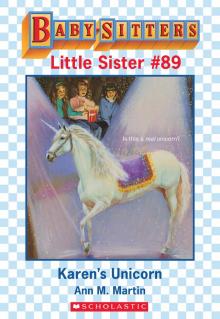 Karen's Unicorn
Karen's Unicorn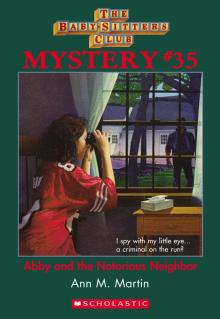 Abby and the Notorious Neighbor
Abby and the Notorious Neighbor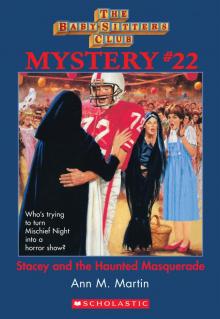 Stacey and the Haunted Masquerade
Stacey and the Haunted Masquerade Claudia Gets Her Guy
Claudia Gets Her Guy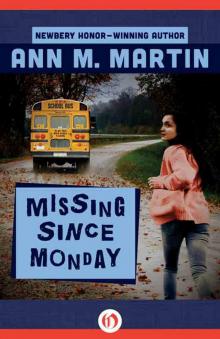 Missing Since Monday
Missing Since Monday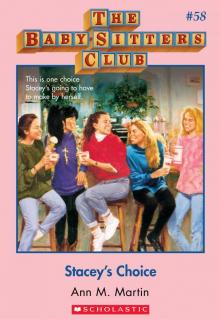 Stacey's Choice
Stacey's Choice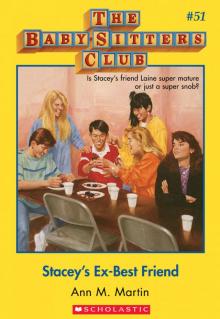 Stacey's Ex-Best Friend
Stacey's Ex-Best Friend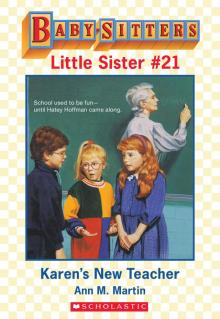 Karen's New Teacher
Karen's New Teacher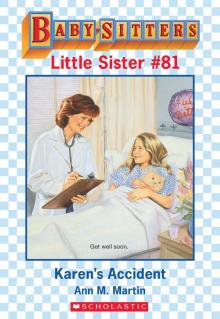 Karen's Accident
Karen's Accident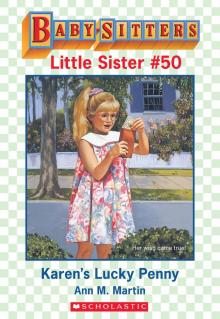 Karen's Lucky Penny
Karen's Lucky Penny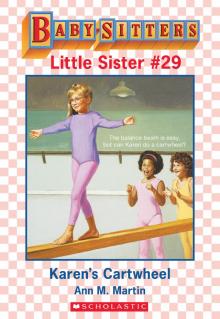 Karen's Cartwheel
Karen's Cartwheel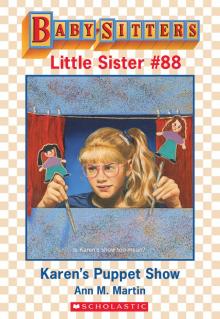 Karen's Puppet Show
Karen's Puppet Show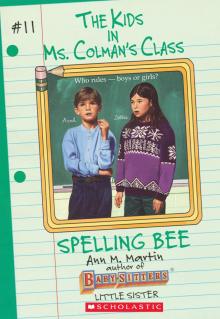 Spelling Bee
Spelling Bee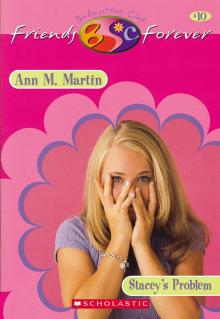 Stacey's Problem
Stacey's Problem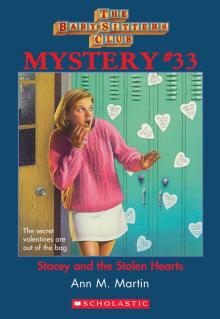 Stacey and the Stolen Hearts
Stacey and the Stolen Hearts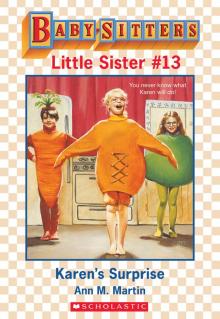 Karen's Surprise
Karen's Surprise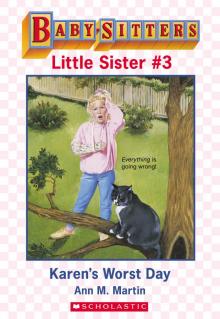 Karen's Worst Day
Karen's Worst Day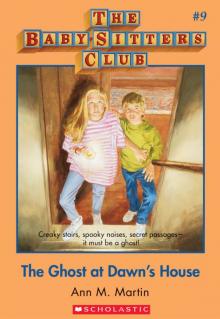 The Ghost at Dawn's House
The Ghost at Dawn's House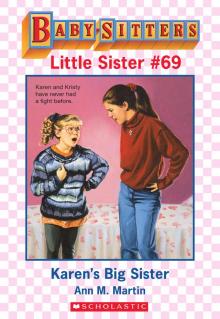 Karen's Big Sister
Karen's Big Sister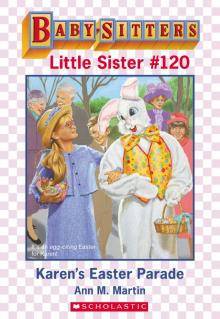 Karen's Easter Parade
Karen's Easter Parade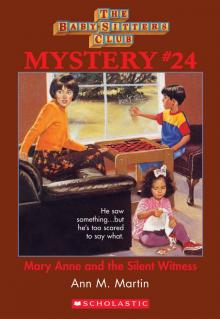 Mary Anne and the Silent Witness
Mary Anne and the Silent Witness Karen's Swim Meet
Karen's Swim Meet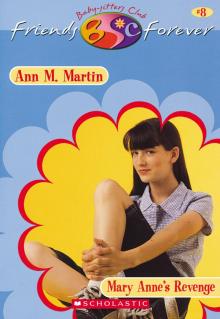 Mary Anne's Revenge
Mary Anne's Revenge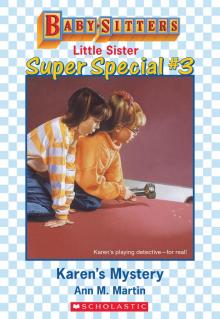 Karen's Mystery
Karen's Mystery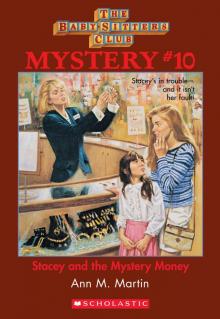 Stacey and the Mystery Money
Stacey and the Mystery Money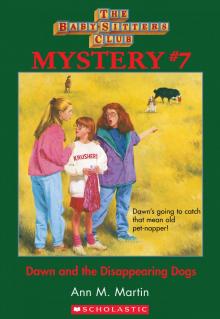 Dawn and the Disappearing Dogs
Dawn and the Disappearing Dogs Karen's Christmas Tree
Karen's Christmas Tree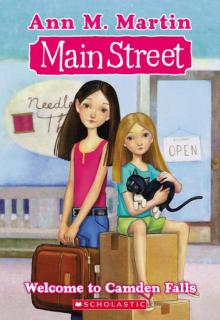 Welcome to Camden Falls
Welcome to Camden Falls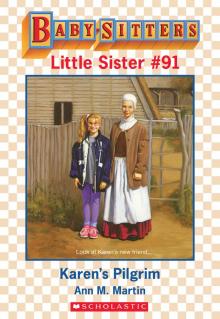 Karen's Pilgrim
Karen's Pilgrim Dawn and the Halloween Mystery
Dawn and the Halloween Mystery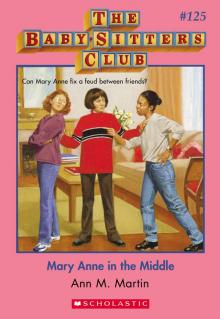 Mary Anne in the Middle
Mary Anne in the Middle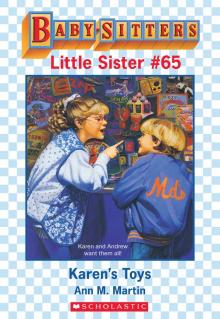 Karen's Toys
Karen's Toys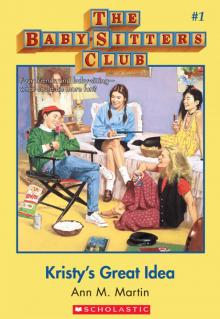 Kristy's Great Idea
Kristy's Great Idea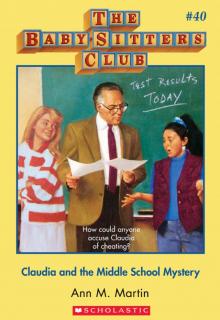 Claudia and the Middle School Mystery
Claudia and the Middle School Mystery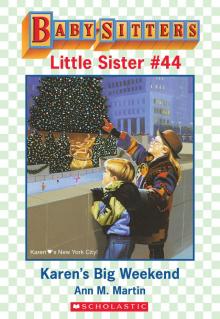 Karen's Big Weekend
Karen's Big Weekend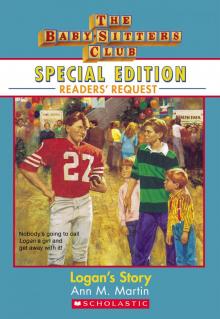 Logan's Story
Logan's Story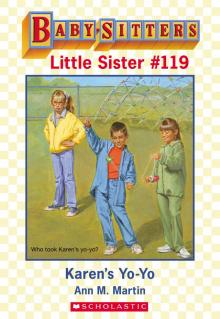 Karen's Yo-Yo
Karen's Yo-Yo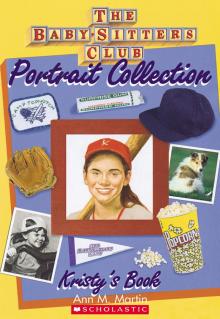 Kristy's Book
Kristy's Book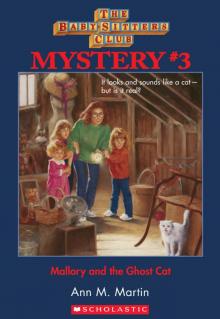 Mallory and the Ghost Cat
Mallory and the Ghost Cat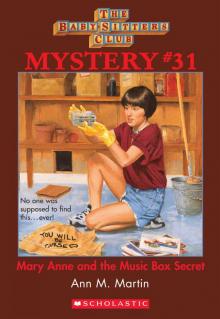 Mary Anne and the Music
Mary Anne and the Music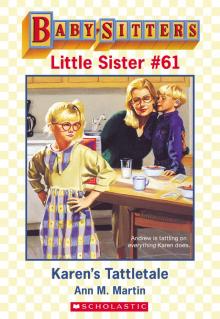 Karen's Tattletale
Karen's Tattletale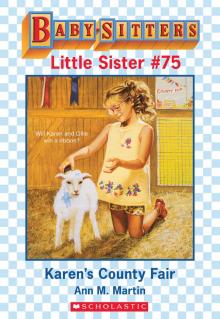 Karen's County Fair
Karen's County Fair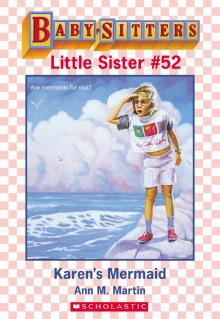 Karen's Mermaid
Karen's Mermaid Snowbound
Snowbound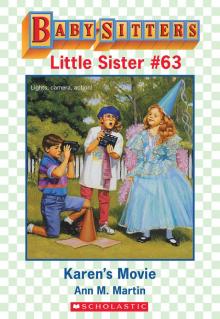 Karen's Movie
Karen's Movie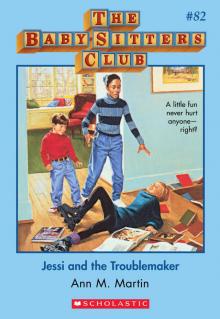 Jessi and the Troublemaker
Jessi and the Troublemaker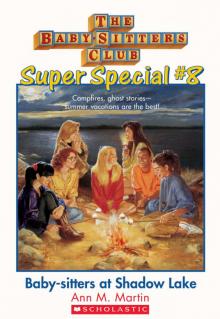 Baby-Sitters at Shadow Lake
Baby-Sitters at Shadow Lake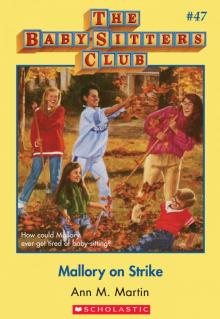 Mallory on Strike
Mallory on Strike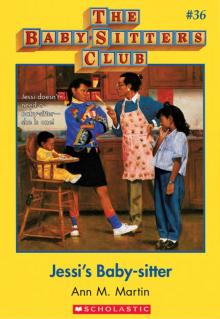 Jessi's Baby-Sitter
Jessi's Baby-Sitter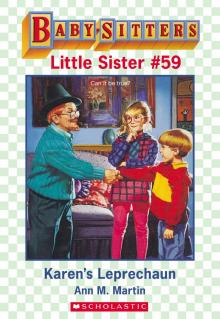 Karen's Leprechaun
Karen's Leprechaun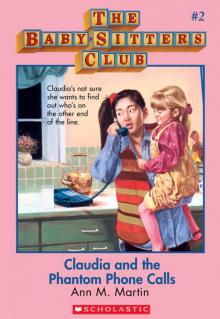 Claudia and the Phantom Phone Calls
Claudia and the Phantom Phone Calls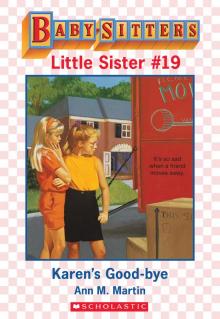 Karen's Good-Bye
Karen's Good-Bye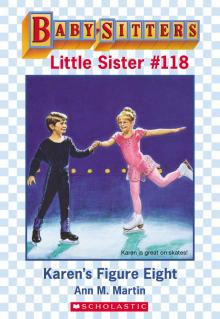 Karen's Figure Eight
Karen's Figure Eight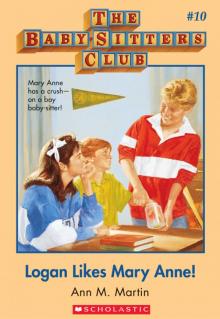 Logan Likes Mary Anne!
Logan Likes Mary Anne!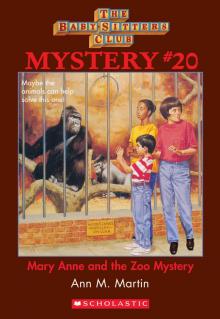 Mary Anne and the Zoo Mystery
Mary Anne and the Zoo Mystery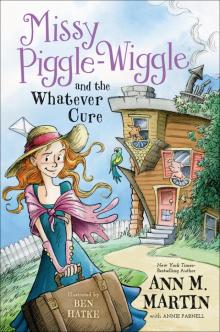 Missy Piggle-Wiggle and the Whatever Cure
Missy Piggle-Wiggle and the Whatever Cure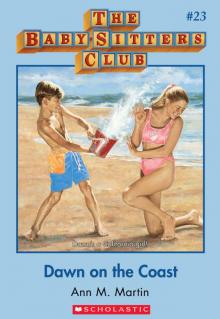 Dawn on the Coast
Dawn on the Coast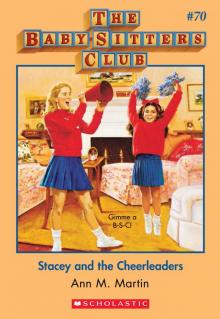 Stacey and the Cheerleaders
Stacey and the Cheerleaders Claudia and the Clue in the Photograph
Claudia and the Clue in the Photograph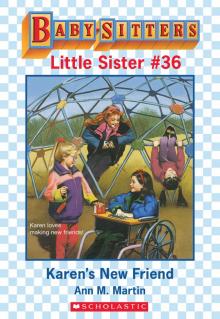 Karen's New Friend
Karen's New Friend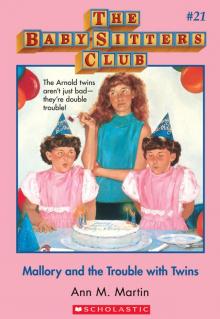 Mallory and the Trouble With Twins
Mallory and the Trouble With Twins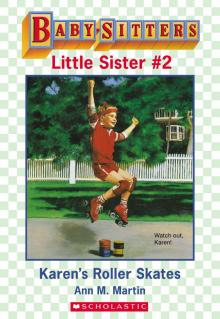 Karen's Roller Skates
Karen's Roller Skates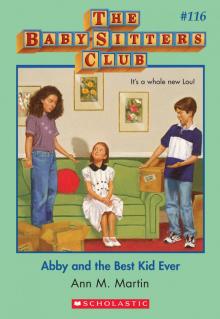 Abby and the Best Kid Ever
Abby and the Best Kid Ever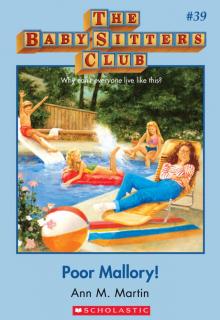 Poor Mallory!
Poor Mallory!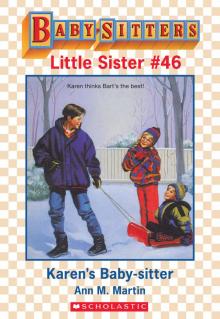 Karen's Witch
Karen's Witch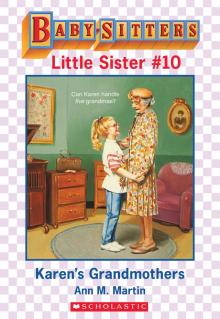 Karen's Grandmothers
Karen's Grandmothers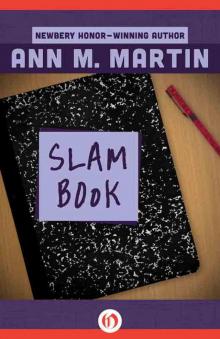 Slam Book
Slam Book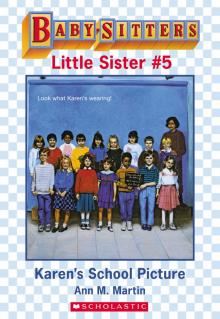 Karen's School Picture
Karen's School Picture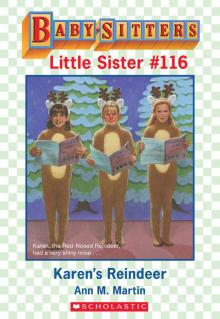 Karen's Reindeer
Karen's Reindeer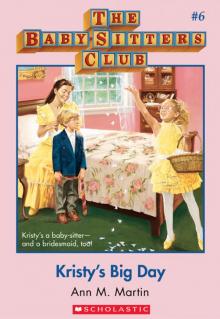 Kristy's Big Day
Kristy's Big Day The Long Way Home
The Long Way Home Karen's Sleigh Ride
Karen's Sleigh Ride On Christmas Eve
On Christmas Eve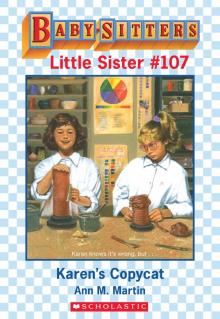 Karen's Copycat
Karen's Copycat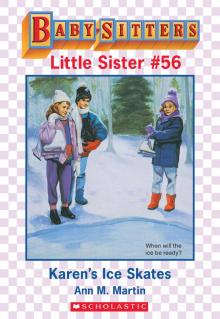 Karen's Ice Skates
Karen's Ice Skates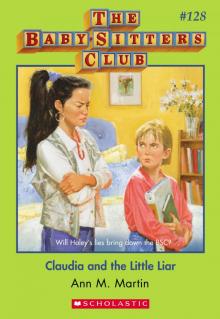 Claudia and the Little Liar
Claudia and the Little Liar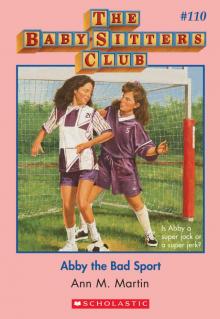 Abby the Bad Sport
Abby the Bad Sport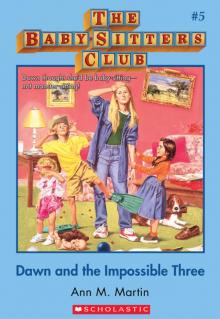 The Baby-Sitters Club #5: Dawn and the Impossible Three
The Baby-Sitters Club #5: Dawn and the Impossible Three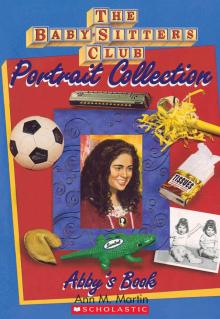 Abby's Book
Abby's Book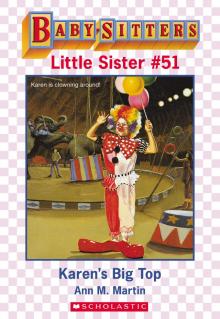 Karen's Big Top
Karen's Big Top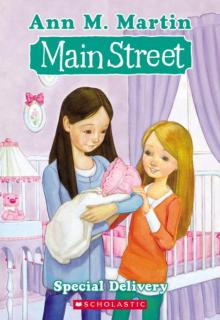 Main Street #8: Special Delivery
Main Street #8: Special Delivery Kristy and the Kidnapper
Kristy and the Kidnapper Karen's Ski Trip
Karen's Ski Trip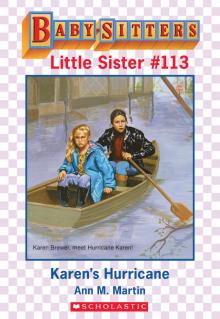 Karen's Hurricane
Karen's Hurricane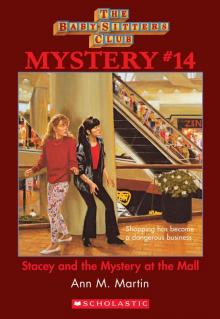 Stacey and the Mystery at the Mall
Stacey and the Mystery at the Mall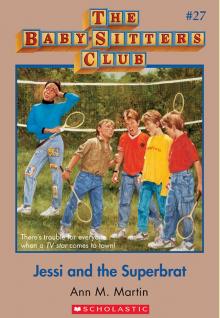 Jessi and the Superbrat
Jessi and the Superbrat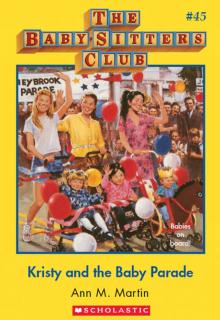 Kristy and the Baby Parade
Kristy and the Baby Parade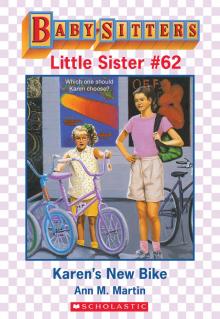 Karen's New Bike
Karen's New Bike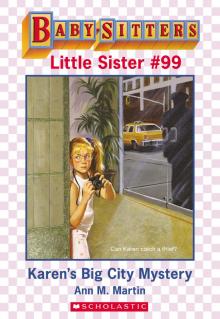 Karen's Big City Mystery
Karen's Big City Mystery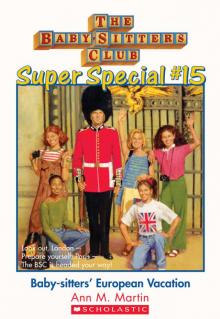 Baby-Sitters' European Vacation
Baby-Sitters' European Vacation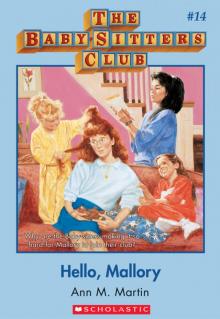 Hello, Mallory
Hello, Mallory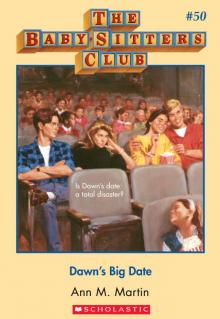 Dawn's Big Date
Dawn's Big Date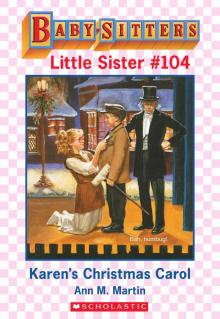 Karen's Christmas Carol
Karen's Christmas Carol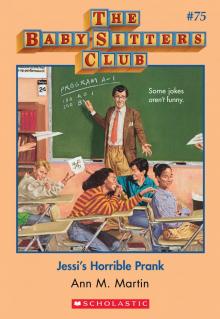 Jessi's Horrible Prank
Jessi's Horrible Prank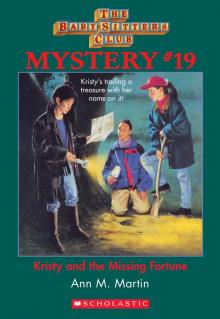 Kristy and the Missing Fortune
Kristy and the Missing Fortune Kristy and the Haunted Mansion
Kristy and the Haunted Mansion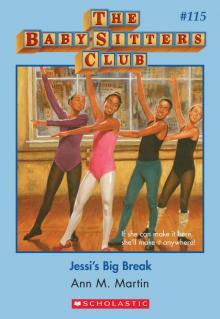 Jessi's Big Break
Jessi's Big Break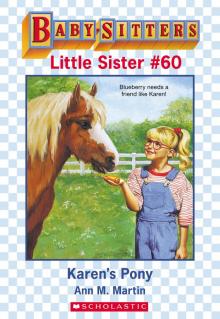 Karen's Pony
Karen's Pony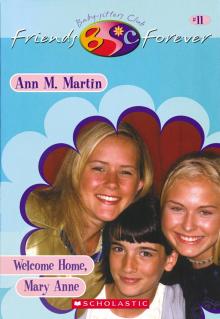 Welcome Home, Mary Anne
Welcome Home, Mary Anne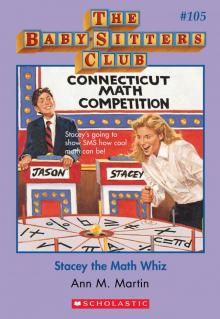 Stacey the Math Whiz
Stacey the Math Whiz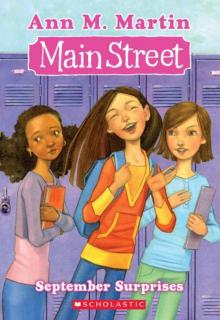 September Surprises
September Surprises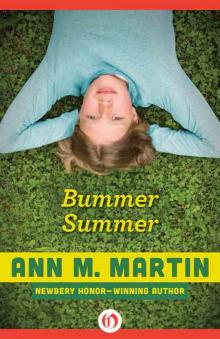 Bummer Summer
Bummer Summer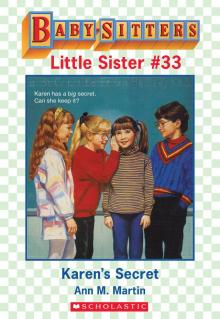 Karen's Secret
Karen's Secret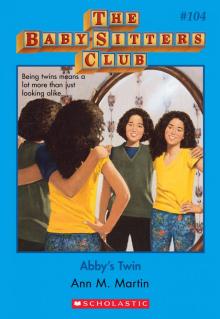 Abby's Twin
Abby's Twin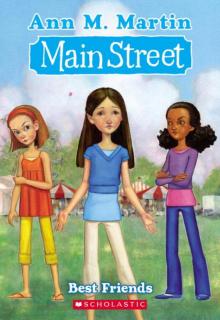 Main Street #4: Best Friends
Main Street #4: Best Friends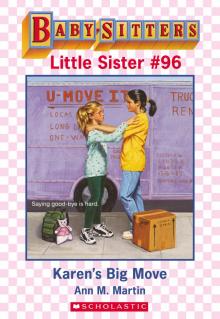 Karen's Big Move
Karen's Big Move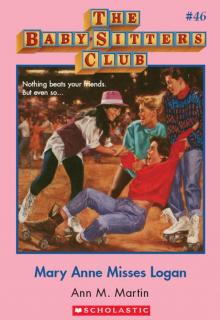 Mary Anne Misses Logan
Mary Anne Misses Logan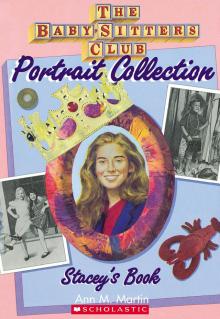 Stacey's Book
Stacey's Book Claudia and the Perfect Boy
Claudia and the Perfect Boy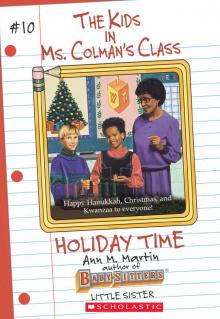 Holiday Time
Holiday Time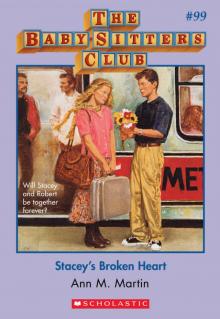 Stacey's Broken Heart
Stacey's Broken Heart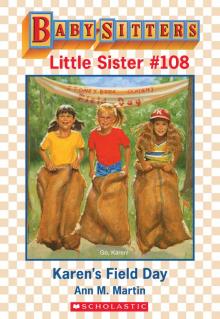 Karen's Field Day
Karen's Field Day Kristy's Worst Idea
Kristy's Worst Idea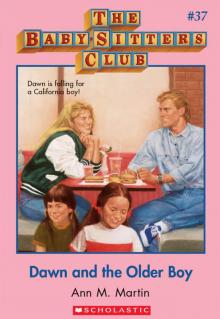 Dawn and the Older Boy
Dawn and the Older Boy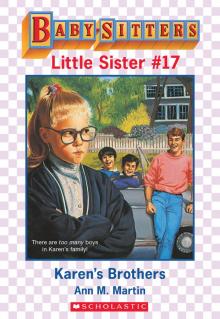 Karen's Brothers
Karen's Brothers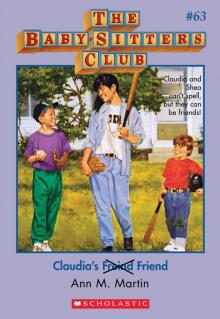 Claudia's Friend
Claudia's Friend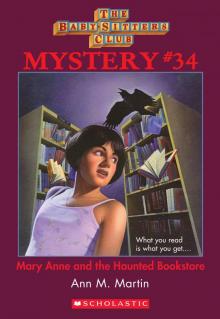 Mary Anne and the Haunted Bookstore
Mary Anne and the Haunted Bookstore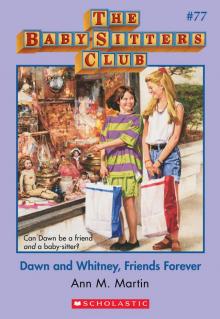 Dawn and Whitney, Friends Forever
Dawn and Whitney, Friends Forever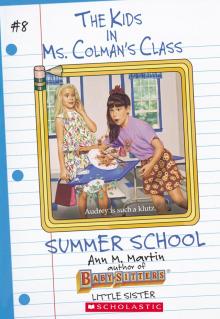 Summer School
Summer School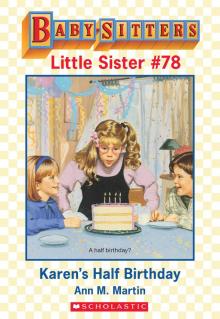 Karen's Birthday
Karen's Birthday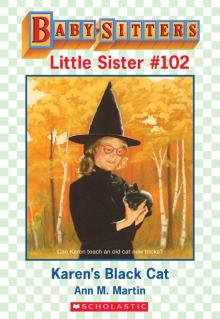 Karen's Black Cat
Karen's Black Cat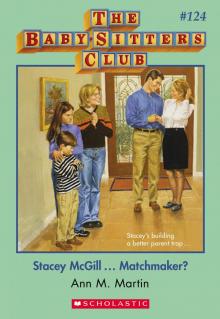 Stacey McGill... Matchmaker?
Stacey McGill... Matchmaker?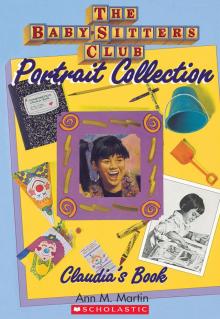 Claudia's Book
Claudia's Book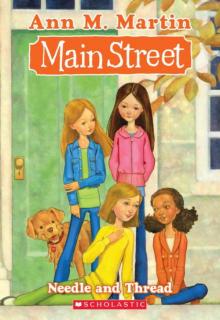 Main Street #2: Needle and Thread
Main Street #2: Needle and Thread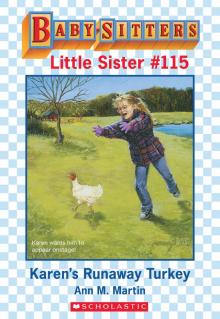 Karen's Runaway Turkey
Karen's Runaway Turkey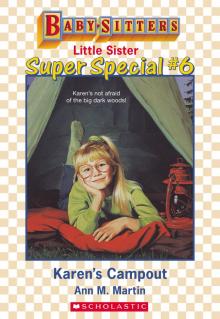 Karen's Campout
Karen's Campout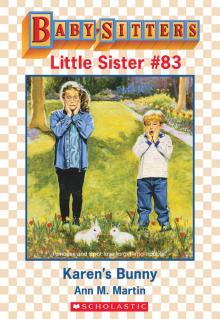 Karen's Bunny
Karen's Bunny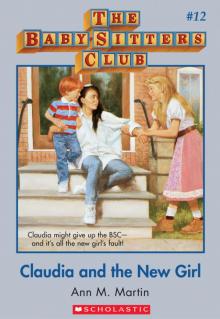 Claudia and the New Girl
Claudia and the New Girl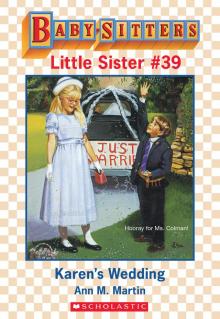 Karen's Wedding
Karen's Wedding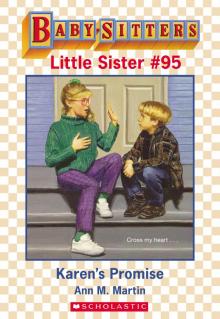 Karen's Promise
Karen's Promise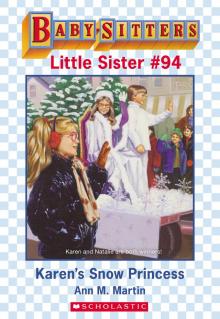 Karen's Snow Princess
Karen's Snow Princess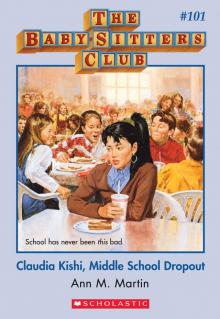 Claudia Kishi, Middle School Dropout
Claudia Kishi, Middle School Dropout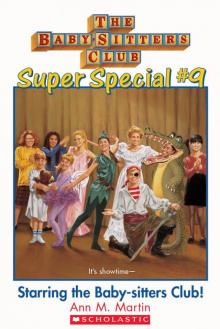 Starring the Baby-Sitters Club!
Starring the Baby-Sitters Club!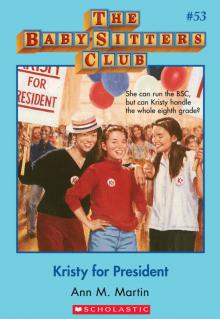 Kristy for President
Kristy for President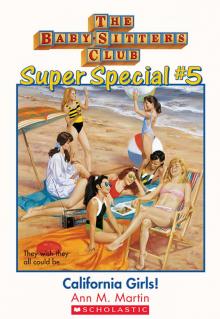 California Girls!
California Girls!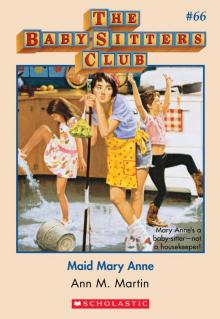 Maid Mary Anne
Maid Mary Anne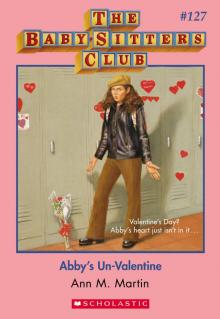 Abby's Un-Valentine
Abby's Un-Valentine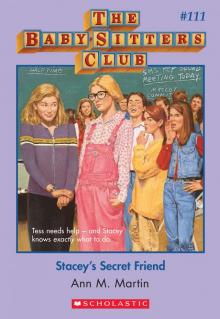 Stacey's Secret Friend
Stacey's Secret Friend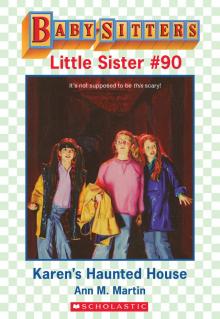 Karen's Haunted House
Karen's Haunted House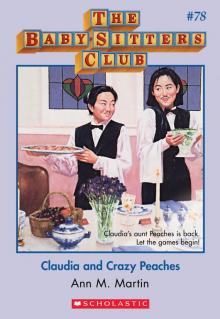 Claudia and Crazy Peaches
Claudia and Crazy Peaches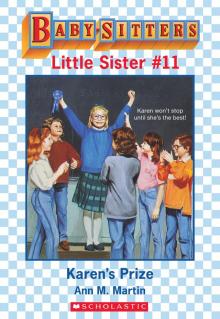 Karen's Prize
Karen's Prize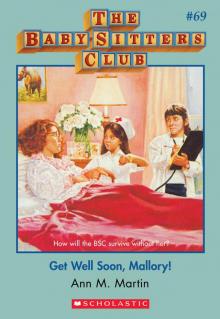 Get Well Soon, Mallory!
Get Well Soon, Mallory!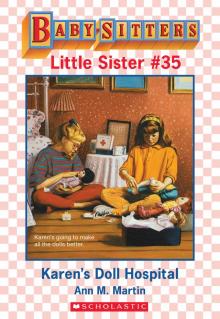 Karen's Doll Hospital
Karen's Doll Hospital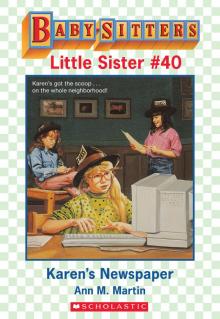 Karen's Newspaper
Karen's Newspaper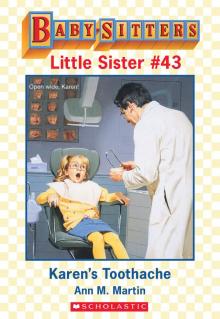 Karen's Toothache
Karen's Toothache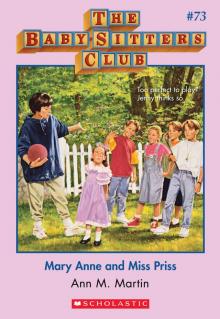 Mary Anne and Miss Priss
Mary Anne and Miss Priss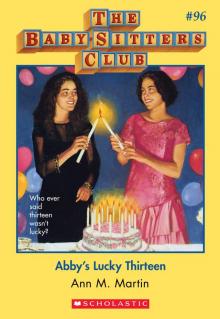 Abby's Lucky Thirteen
Abby's Lucky Thirteen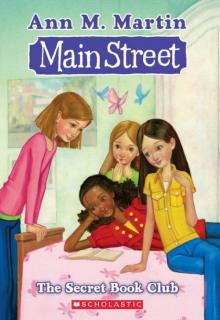 The Secret Book Club
The Secret Book Club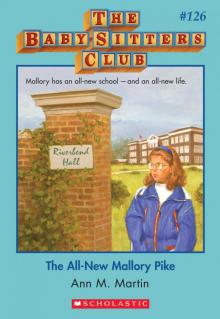 The All-New Mallory Pike
The All-New Mallory Pike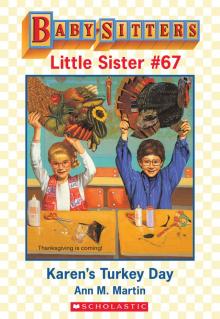 Karen's Turkey Day
Karen's Turkey Day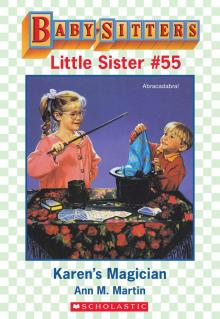 Karen's Magician
Karen's Magician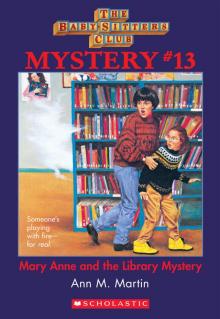 Mary Anne and the Library Mystery
Mary Anne and the Library Mystery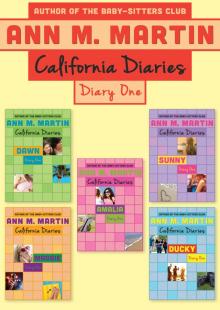 Diary One: Dawn, Sunny, Maggie, Amalia, and Ducky
Diary One: Dawn, Sunny, Maggie, Amalia, and Ducky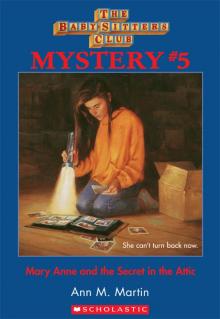 Mary Anne and the Secret in the Attic
Mary Anne and the Secret in the Attic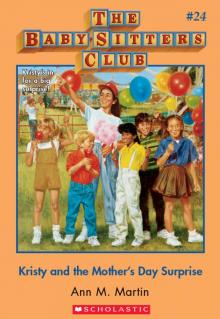 Kristy and the Mother's Day Surprise
Kristy and the Mother's Day Surprise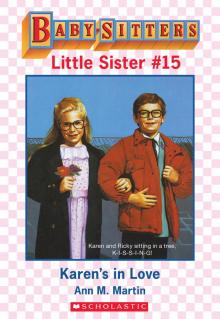 Karen's in Love
Karen's in Love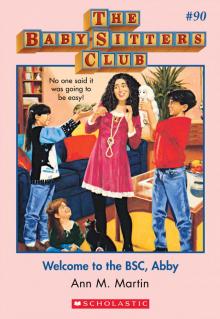 Welcome to the BSC, Abby
Welcome to the BSC, Abby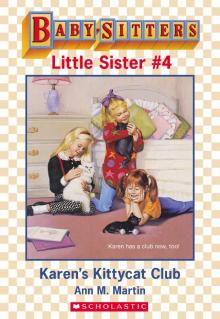 Karen's Kittycat Club
Karen's Kittycat Club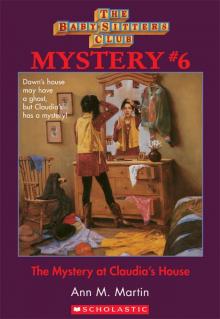 The Mystery at Claudia's House
The Mystery at Claudia's House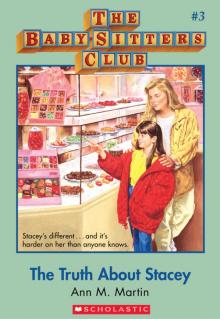 The Truth About Stacey
The Truth About Stacey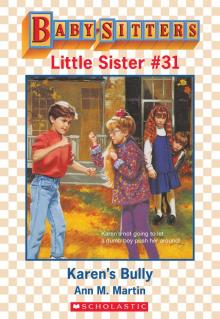 Karen's Bully
Karen's Bully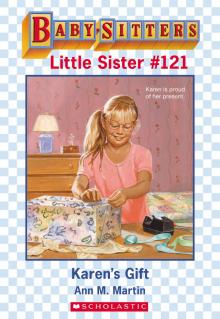 Karen's Gift
Karen's Gift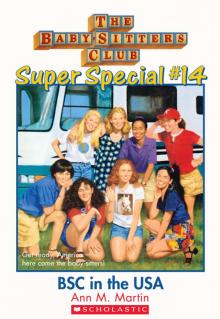 BSC in the USA
BSC in the USA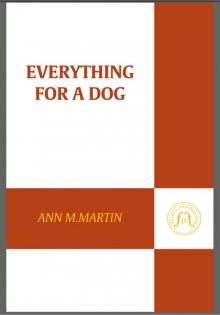 Everything for a Dog
Everything for a Dog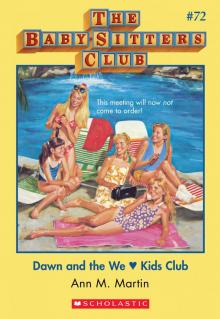 Dawn and the We Love Kids Club
Dawn and the We Love Kids Club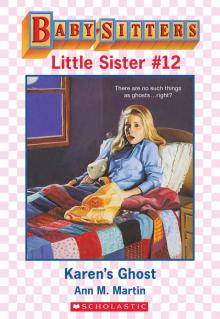 Karen's Ghost
Karen's Ghost Stacey's Lie
Stacey's Lie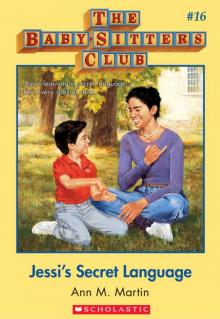 Jessi's Secret Language
Jessi's Secret Language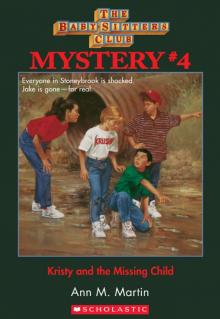 Kristy and the Missing Child
Kristy and the Missing Child Better to Wish
Better to Wish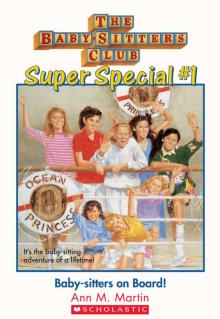 Baby-Sitters on Board!
Baby-Sitters on Board!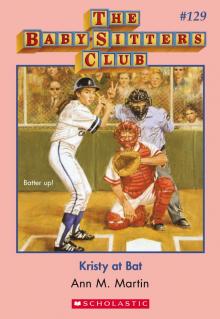 Kristy at Bat
Kristy at Bat Everything Changes
Everything Changes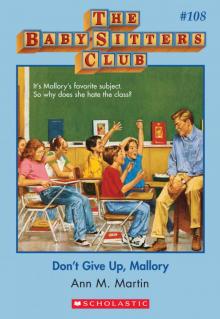 Don't Give Up, Mallory
Don't Give Up, Mallory A Dog's Life: The Autobiography of a Stray
A Dog's Life: The Autobiography of a Stray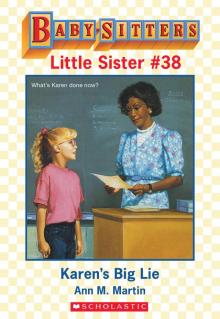 Karen's Big Lie
Karen's Big Lie Karen's Show and Share
Karen's Show and Share Mallory Hates Boys (and Gym)
Mallory Hates Boys (and Gym)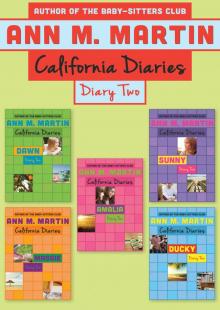 Diary Two: Dawn, Sunny, Maggie, Amalia, and Ducky
Diary Two: Dawn, Sunny, Maggie, Amalia, and Ducky Karen's Pen Pal
Karen's Pen Pal Claudia and the Friendship Feud
Claudia and the Friendship Feud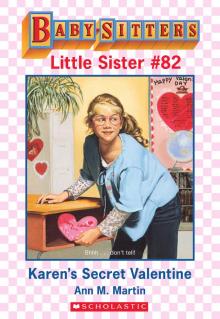 Karen's Secret Valentine
Karen's Secret Valentine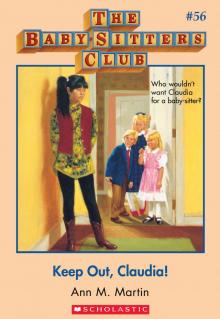 Keep Out, Claudia!
Keep Out, Claudia! Aloha, Baby-Sitters!
Aloha, Baby-Sitters!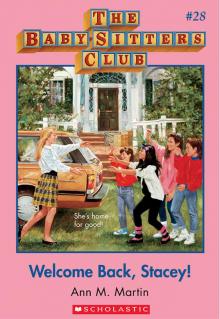 Welcome Back, Stacey
Welcome Back, Stacey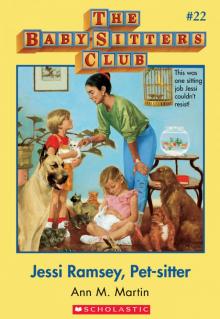 Jessi Ramsey, Pet-Sitter
Jessi Ramsey, Pet-Sitter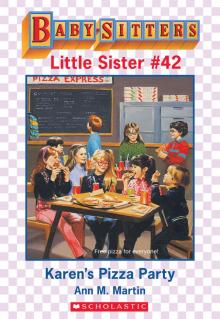 Karen's Pizza Party
Karen's Pizza Party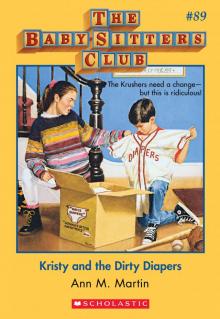 Kristy and the Dirty Diapers
Kristy and the Dirty Diapers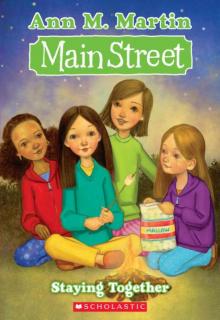 Staying Together
Staying Together Dawn and the Surfer Ghost
Dawn and the Surfer Ghost Claudia Makes Up Her Mind
Claudia Makes Up Her Mind Jessi's Gold Medal
Jessi's Gold Medal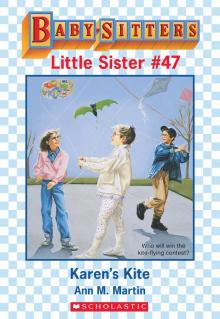 Karen's Kite
Karen's Kite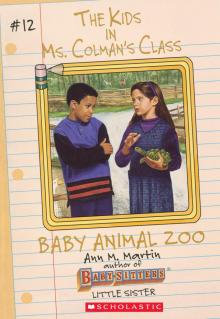 Baby Animal Zoo
Baby Animal Zoo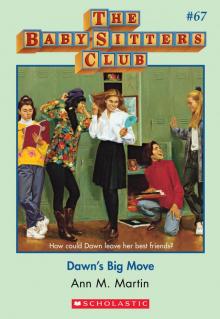 Dawn's Big Move
Dawn's Big Move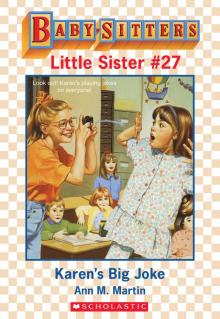 Karen's Big Joke
Karen's Big Joke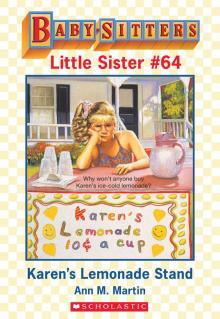 Karen's Lemonade Stand
Karen's Lemonade Stand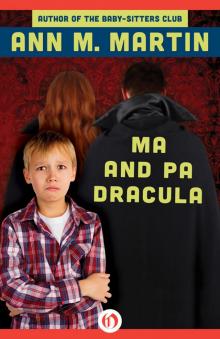 Ma and Pa Dracula
Ma and Pa Dracula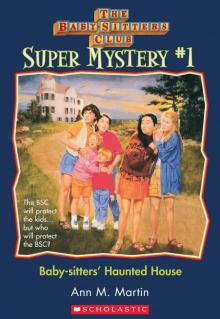 Baby-Sitters' Haunted House
Baby-Sitters' Haunted House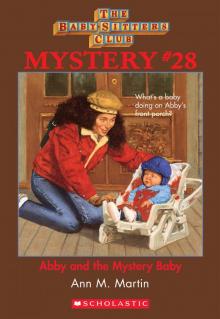 Abby and the Mystery Baby
Abby and the Mystery Baby Home Is the Place
Home Is the Place Karen's Grandad
Karen's Grandad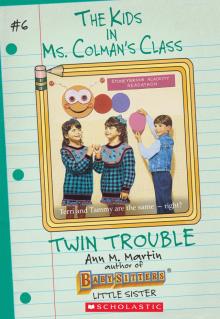 Twin Trouble
Twin Trouble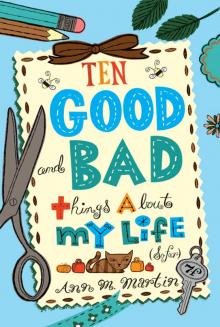 Ten Good and Bad Things About My Life (So Far)
Ten Good and Bad Things About My Life (So Far)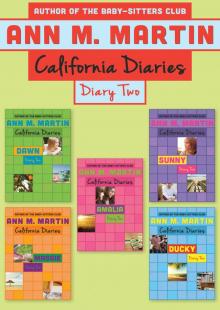 Diary Two
Diary Two Baby-Sitters Club 027
Baby-Sitters Club 027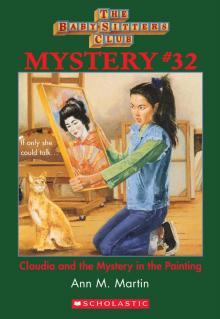 Claudia and the Mystery Painting
Claudia and the Mystery Painting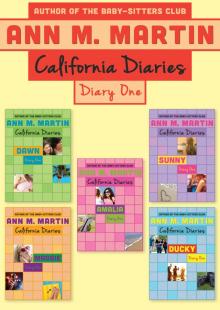 Diary One
Diary One Baby-Sitters Club 037
Baby-Sitters Club 037 Baby-Sitters Club 028
Baby-Sitters Club 028 Baby-Sitters Club 085
Baby-Sitters Club 085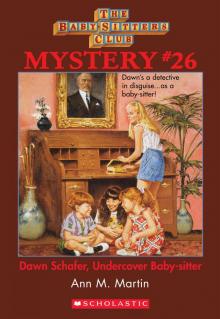 Dawn Schaffer Undercover Baby-Sitter
Dawn Schaffer Undercover Baby-Sitter Jessi's Babysitter
Jessi's Babysitter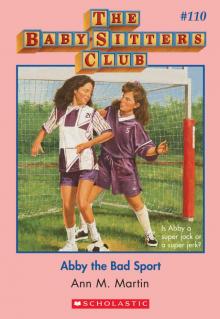 The Baby-Sitters Club #110: Abby the Bad Sport (Baby-Sitters Club, The)
The Baby-Sitters Club #110: Abby the Bad Sport (Baby-Sitters Club, The) Karen's Little Sister
Karen's Little Sister Baby-Sitters Club 058
Baby-Sitters Club 058 Claudia And The Genius On Elm St.
Claudia And The Genius On Elm St.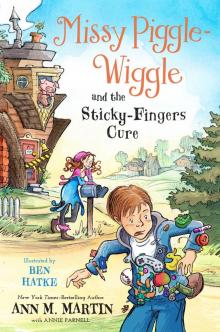 Missy Piggle-Wiggle and the Sticky-Fingers Cure
Missy Piggle-Wiggle and the Sticky-Fingers Cure Kristy and Kidnapper
Kristy and Kidnapper Baby-Sitters Club 041
Baby-Sitters Club 041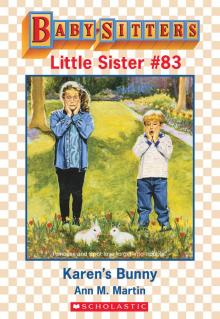 Karen's Bunny Trouble
Karen's Bunny Trouble Baby-Sitters Club 032
Baby-Sitters Club 032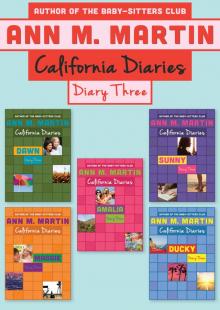 Diary Three
Diary Three Christmas Chiller
Christmas Chiller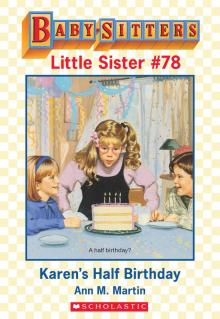 Karen's Half-Birthday
Karen's Half-Birthday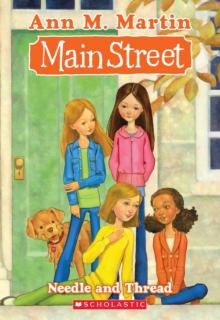 Needle and Thread
Needle and Thread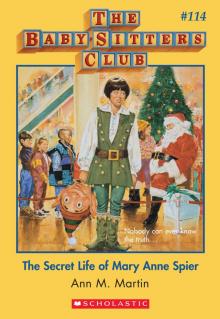 Secret Life of Mary Anne Spier
Secret Life of Mary Anne Spier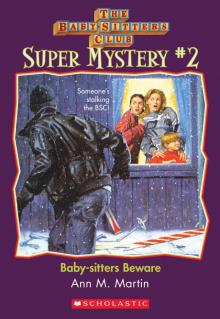 Baby-Sitters Beware
Baby-Sitters Beware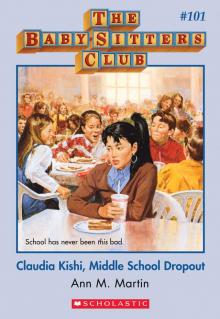 Claudia Kishi, Middle School Drop-Out
Claudia Kishi, Middle School Drop-Out Logan Likes Mary Anne !
Logan Likes Mary Anne ! Baby-Sitters Club 061
Baby-Sitters Club 061 Best Friends
Best Friends Baby-Sitters Club 031
Baby-Sitters Club 031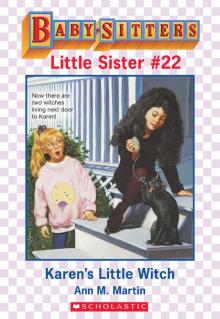 Karen's Little Witch
Karen's Little Witch Jessi Ramsey, Petsitter
Jessi Ramsey, Petsitter Baby-Sitters Club 123
Baby-Sitters Club 123 Baby-Sitters Club 059
Baby-Sitters Club 059 Baby-Sitters Club 033
Baby-Sitters Club 033 Baby-Sitters Club 060
Baby-Sitters Club 060 Baby-Sitters Club 094
Baby-Sitters Club 094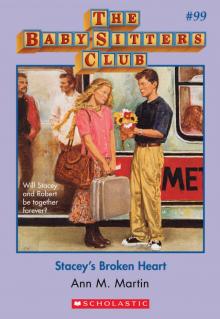 The Baby-Sitters Club #99: Stacey's Broken Heart
The Baby-Sitters Club #99: Stacey's Broken Heart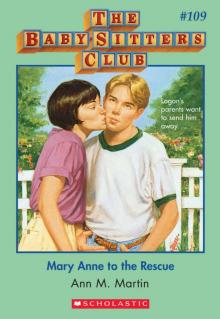 The Baby-Sitters Club #109: Mary Anne to the Rescue (Baby-Sitters Club, The)
The Baby-Sitters Club #109: Mary Anne to the Rescue (Baby-Sitters Club, The) Mystery At Claudia's House
Mystery At Claudia's House Claudia And The Sad Goodbye
Claudia And The Sad Goodbye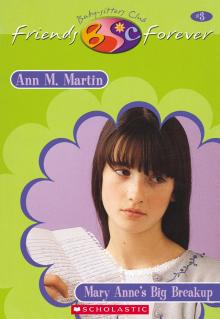 Mary Anne's Big Break-Up
Mary Anne's Big Break-Up Baby-Sitters Club 025
Baby-Sitters Club 025 Baby-Sitters Club 042
Baby-Sitters Club 042 Stacey and the Mystery of the Empty House
Stacey and the Mystery of the Empty House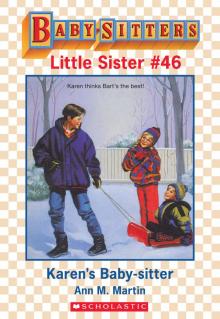 Karen's Baby-Sitter
Karen's Baby-Sitter Claudia's Friendship Feud
Claudia's Friendship Feud Baby-Sitters Club 090
Baby-Sitters Club 090 Baby-Sitters Club 021
Baby-Sitters Club 021 Baby-Sitters Club 056
Baby-Sitters Club 056 Baby-Sitters Club 040
Baby-Sitters Club 040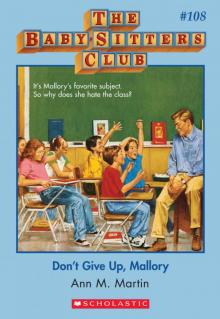 The Baby-Sitters Club #108: Don't Give Up, Mallory (Baby-Sitters Club, The)
The Baby-Sitters Club #108: Don't Give Up, Mallory (Baby-Sitters Club, The)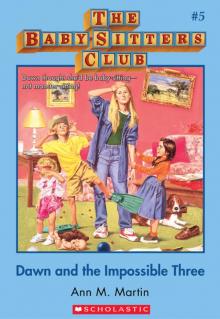 Dawn and the Impossible Three
Dawn and the Impossible Three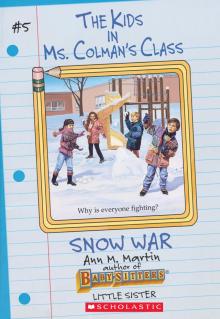 The Snow War
The Snow War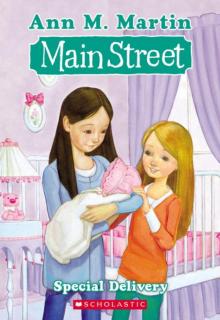 Special Delivery
Special Delivery Baby-Sitters Club 057
Baby-Sitters Club 057 Mary Anne And Too Many Babies
Mary Anne And Too Many Babies Baby-Sitters Club 030
Baby-Sitters Club 030